#reflecting on the 99 names of Allah
Text
For all the times we felt lonely, and no one was there for us, perhaps it was a nudge from Al-Qarīb Al-Mujīb — saying; “I am still here. Ask Me.”
22 notes
·
View notes
Text

Allah calls Himself Al-‘Afuww—The Pardoner, The Eliminator of Sins, The Effacer— on five occasions in the Quran. He is the One who can make any sin or mistake disappear. Al-‘Afuww not only forgives but can also remove wrong actions, errors, and faults, leaving no trace of them!
The One who eliminates sins, The Pardoner
‘Afuww comes from the root ‘ayn-faa-waw, which points to three main meanings. The first main meaning is to forgive and pardon and the second is to efface and remove. The third main meaning is to give willingly and more than what is due.
This root appears 35 times in the Quran in four derived forms. Examples of these forms are ‘afaa (forgave), al-‘afwa (the surplus, (to) forgiveness) and wal ‘aafeena (those who pardon).
Linguistically, ‘afw refers to two concepts, one of which is to remove all traces. In the Arabic language it is sometimes used with wind referring to its blowing and removing of footprints etc. The other concept is to willingly give others without constraint. Al-‘Afuww is the One who removes and erases someone’s sins, mistakes, errors and faults and their traces and consequently becomes pleased with one. He is the One who then grants them blessings willingly without even being asked!
Al-‘Afuww Himself says: Indeed, Allah is ever Pardoning and Forgiving [Quran, 4:43] . . . For those it is expected that Allah will pardon them, and Allah is ever Pardoning and Forgiving [Quran, 4:99] and .. If [instead] you show [some] good or conceal it or pardon an offense – indeed, Allah is ever Pardoning and Competent. [Quran, 4:149]
Difference between pardoning and forgiving
Of the five times, Allah’s name Al-‘Afuww is mentioned four times with His name Al-Ghafoor (The Forgiving) in the Quran. Allah ‘azza wa jall might forgive some people and pardon others. Forgiving means that Allah ‘azza wa jall conceals our sins and mistakes and we will not be punished for them on the Day of Judgement. However, they are still there in our book of deeds. When Allah pardons the sins of people, the sins are completely erased from their book of deeds; He will not even remind them of their sins, nor question them, simply because their sins have been removed. Pardon is greater than forgiveness!
Grave sins and pardon in the Quran
Allah’s pardon is mentioned in the Quran along with grave sins, such as Baani Israeel who worshipped the calf: Then We forgave you after that so perhaps you would be grateful. [Quran, 2:52] And those who turned away at the battle of Uhud: Then he turned you back from them [defeated] that He might test you. And He has already forgiven you, and Allah is the possessor of bounty for the believers. [Quran, 3:152] This is the beautiful pardon of Al-‘Afuww!
How can you live by this Name?
1.Pardon others.
The people who surpress anger and pardon others are the people of Paradise. Al-‘Afuww says: Who spend [in the cause of Allah] during ease and hardship and who restrain anger and who pardon the people – and Allah loves the doers of good [Quran, 3:134] Ibn Katheer mentions: They forgive those who treat them with injustice. Therefore, they do not hold any ill feelings about anyone in their hearts, and this is the most excellent conduct in this regard.
Fight against your ego and ask Al-‘Afuww to help you to not even leave a trace of bad feelings and resentment in your heart. If someone wrongs you, think about your own sins and those who you wronged. Strive to pardon others so that Allah ‘azza wa jall may pardon you!
2. Don’t remind others of their mistakes.
Al-‘Afuww is the One who pardons with no reproach. After overlooking other people’s mistakes or wrong actions towards you, try not to remind them of these bad deeds afterwards. Allah ‘azza wa jall is the One who pardons and never mentions your sins again!
3. Increase your love.
Imagine Allah ‘azza wa jall pardoned all your past sins; not a single sins would be recorded in your book of deeds. Reflect on how much you should love Al-‘Afuww! A beautiful opportunity is Laylatul Qadr, which comes once a year in Ramadhan. Value this crucial night, seek it with your best deeds, and remind yourself that night and every other night how beautiful the pardoning of Allah ‘azza wajal is!
4. Say this dua from your heart.
A beautiful dua with this name is the one the Prophet salallahu ‘alayhi wa sallam taught Aishah radiyallahu ‘anhaa, when she asked him: “O Messenger of Allah! If I find the Night of Al-Qadr what should I say?” He sallallahu ‘alayhi wa sallam replied, say:
O Allah! Verily You are the Oft-Pardoning, You love to pardon, so pardon me [Ahmad, At-Tirmidhee, An-Nasaa’i, Ibn Majah] Memorize this dua and beg Al-‘Afuww with is sincerely. Recognize your sins, be humble and then aim high, not only asking your Lord for forgiveness, but for Him to pardon each and every sin you committed!
O Allah, Al-‘Afuww, we know that You can erase all sins. Grant us the strength to pardon others and make us reflect on Your love and blessings upon us. Aid us to obey you and guide us in keep asking You sincerely to pardon all our sins, mistakes, neglect, errors and faults so we will not even be questioned about them on the Day of Judgement, ameen!
#allah#islam#revert help team#asma al husna#revert help#muslim#ayat#daily#allah’s name#dua#pray#prayer#salah#muslimah#hijab#religion#reminder#mohammed#new muslim#new revert#new convert#how to convert islam#converthelp#convert islam#become a muslim#welcome to islam#daily ayat#prophet#god#revert
7 notes
·
View notes
Text
4/99
The 99 Name of Allah (SWT)
Al-Quddus (The Most Sacred/The Most Holy)
Written in arabic: ٱلْقُدُّوسُ
The One who is pure from any imperfection and clear from children and adversaries for Allah سُبْحَٰنَهُۥ وَتَعَٰلَىٰ is Al-Qaddus, so far removed of any imperfection. He has no shortcomings, evil is not attributed to Him. The mere mention of being free from defects borders on insult as it implies the possibility of imperfection. He transcends all that we perceive as perfection, it is inconceivable. All sublime attributes belong to Him.
The Qur'an mentions the concept of the Holy Spirit (Ruh al-Qaddus) four times. It is understood that He purifies and makes holy through this spirit. This is the concept of the divine force and influence Allah سُبْحَٰنَهُۥ وَتَعَٰلَىٰ has over His creatures. Whenever you see either Ruh al-Qaddus or Ruh al-Amin (the faithful or trustworthy spirit, see 26:193 for example) scholars interpret it as being interchangeable with the Angel Jibrel. In the tafsir of Ibn Kathir for Surah Maidah ayah 110, "O `Isa, son of Maryam! Remember My favor to you and to your mother when I supported you with Ruh il-Qudus (Jibril) so that you spoke to the people in the cradle and in maturity." When Allah سُبْحَٰنَهُۥ وَتَعَٰلَىٰ mentions the passing of this spirit it's understood as to cast a reflection of His divine characteristics on His creation. It makes a thing pure, and wholesome and removes any imperfections. Isa (as) was gifted with this quality making him infallible.
#islamic#namaz#muslims#duaa#poetic#islamic knowledge#islampost#islamdaily#learning#knowledge#allahﷻ#allah#99 names of allah
7 notes
·
View notes
Text
Al-Wahhab: The Giver of Gifts
Sometimes things happen to us in our lives, and we do not know how to read events. We may suddenly lose all our money, and the first thing that we think of is, “What did I do to deserve this? I was a good Muslim, I tried so hard, why did Allah punish me?” Or perhaps something amazing happens to us, and our reactions range from “Alhamdulilah!” (all praise is to God) to “I just got lucky.”
Our reactions say a lot about us and about our knowledge of and relationship with Allah subhanahu wa ta`ala (exalted is He). If our best friend does something, because we know them, we know how to read their actions and their dealings with us. Unfortunately, we do not know nearly as much about Allah (swt), even though He is closer to us than our jugular vein, and even though He invites us to call Him by His Names:
“ولله الأسماء الحسنى فادعوهُ بها”
“And to Allah belong the best names, so invoke Him by them.” (Qur’an, 7:180)
How can we call Him by His Names if we do not know them and if we do not understand them? And what is the purpose of Allah (swt) revealing to us 99 of His Names and His Attributes? It is in order for us to know Him, and through knowing Him, we are able to worship Him better and understand the nature of this world. One of the scholars mentioned a saying:
“If one knows the commander, the commands are easy to follow.”
Al-Wahhab: The Constant Bestower of Gifts
Think of the last time someone gave you a gift—how did you feel? A feeling of joy, love, of being special to the person from whom you received the gift, and sometimes a bit of shame if you feel you didn’t deserve it. Because, in essence, a gift isn’t given in return of anything.
One of Allah’s Beautiful Names is al-Wahhab. The root of this word is hiba, which means a gift. And because Allah (swt) is al-Wahhab, it means that He not only gives gifts once or twice, but He constantly does so. Allah (swt) tells us in the Qur’an:
“أَمْ عِنْدَهُمْ خَزَائِنُ رَحْمَةِ رَبِّكَ الْعَزِيزِ الْوَهَّابِ”
“Or do they have the depositories of the mercy of your Lord, the Exalted in Might, the Bestower?” (Qur’an, 38:9)
So how do we know when Allah (swt) has given us a gift? Rizq (sustenance) is written for us, but we have to work for it. So if in the course of our efforts, we earn $1 million, that is rizq that Allah (swt) had ordained for us. Hiba, on the other hand, is just that—a gift that was not conditioned upon your efforts. When you get a phone call from someone you love, that you felt you missed—that is hiba. When without planning, you are fortunate enough to be able to go on `umrah (the minor pilgrimage), that is hiba. When Allah (swt) brings an amazing person into your life and you are able to improve because of them, that is hiba.
The Connection Between Gifts and Love
“يا داود ذكر عبادي بإحساني، فإن القلوب جبلت على حبِّ من أحسن إليها وبغض من أساء إليها”
[ ورد في الأثر ]
It is stated in the traditions:
“O Dawud [David], remind people of my favors upon them, because the hearts are inclined to love those that do good to it and detest those that do bad to it.”
Who do you give gifts to? In general, you give gifts to someone you are thinking about and someone that you love. Sometimes we give gifts to endear people to us. So think about what that means when Allah (swt) gives you a gift.
Some of us may be thinking, “But I am so far from Allah. Why would He give me gifts out of love?” Subhan Allah (Glory to God)—our Lord is greater than we imagine. He gives us gifts so that we know that we have a God who does not forget about His creation—even when they fall astray. He gives us gifts as a reminder so that we can come close to Him.
Do you want to be a recipient of al-Wahhab?
We are all recipients of the many gifts of Allah (swt). Out of the 6 billion people in this world, He chose you to be of the ummah (community) of His Prophet ﷺ (peace be upon him). That in itself is a gift that we cannot thank Him enough for. If we all reflect on the many personal blessings in our lives, we cannot help but feel special to Allah (swt). Every little gift and every huge blessing was because al-Wahhab wanted to give you, and you specifically, something.
If you want to be a companion of al-Wahhab, then remember to acknowledge His gifts, even if they seem to be minute, and to thank Him.
Allah (swt) says, “If you are grateful, I will surely increase you [in favor]; but if you deny, indeed, My punishment is severe,” (Qur’an, 14:7). The more we are conscious of Allah’s gifts to us, the more we are able to increase our love for Him, and recognize how blessed we are.
Moreover, we should use His gifts in His way and in His cause. No one likes for their gifts to be cheapened. If Allah (swt) has given you a gift, do not use it for what He dislikes. If we do that, the gift in question becomes a test that we will be held accountable for.
Finally, be a gift giver yourself. The Prophet ﷺ said, “Give gifts, for this will increase your mutual love,” (Muslim).
~Jinan Yousef
5 notes
·
View notes
Text

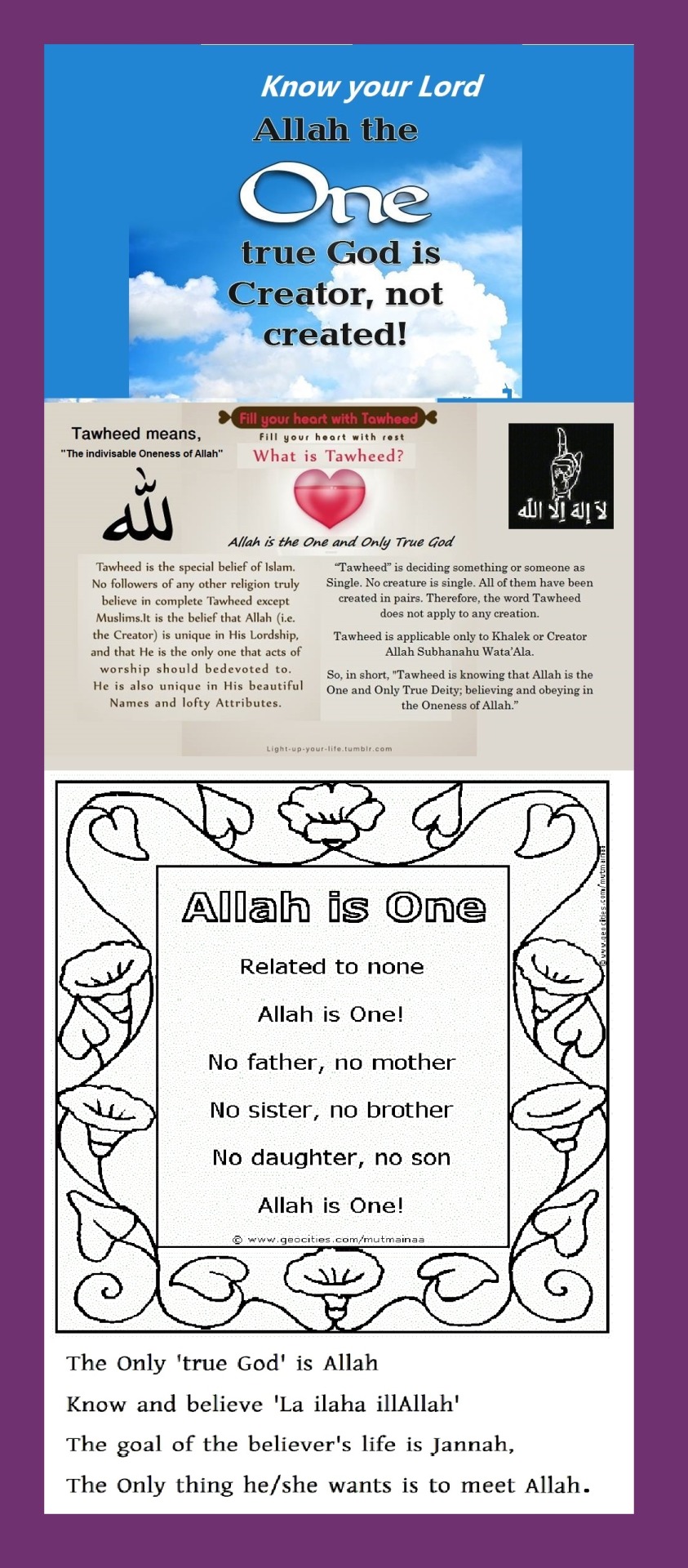

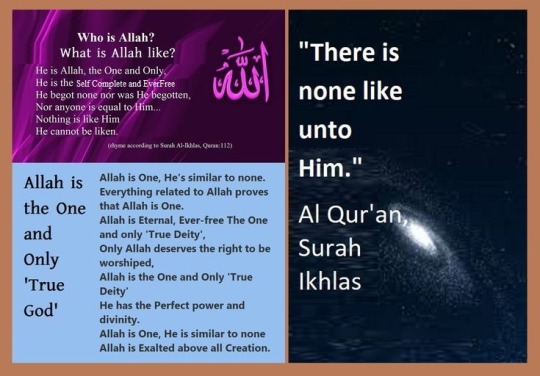
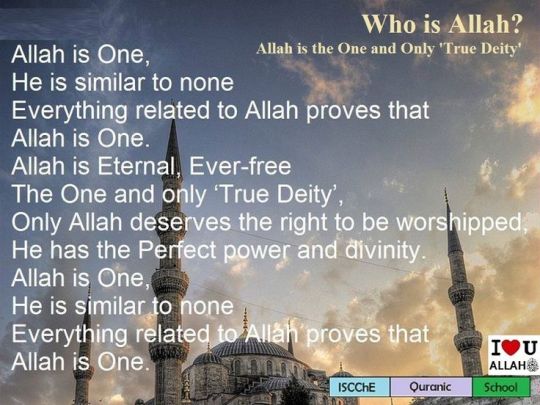



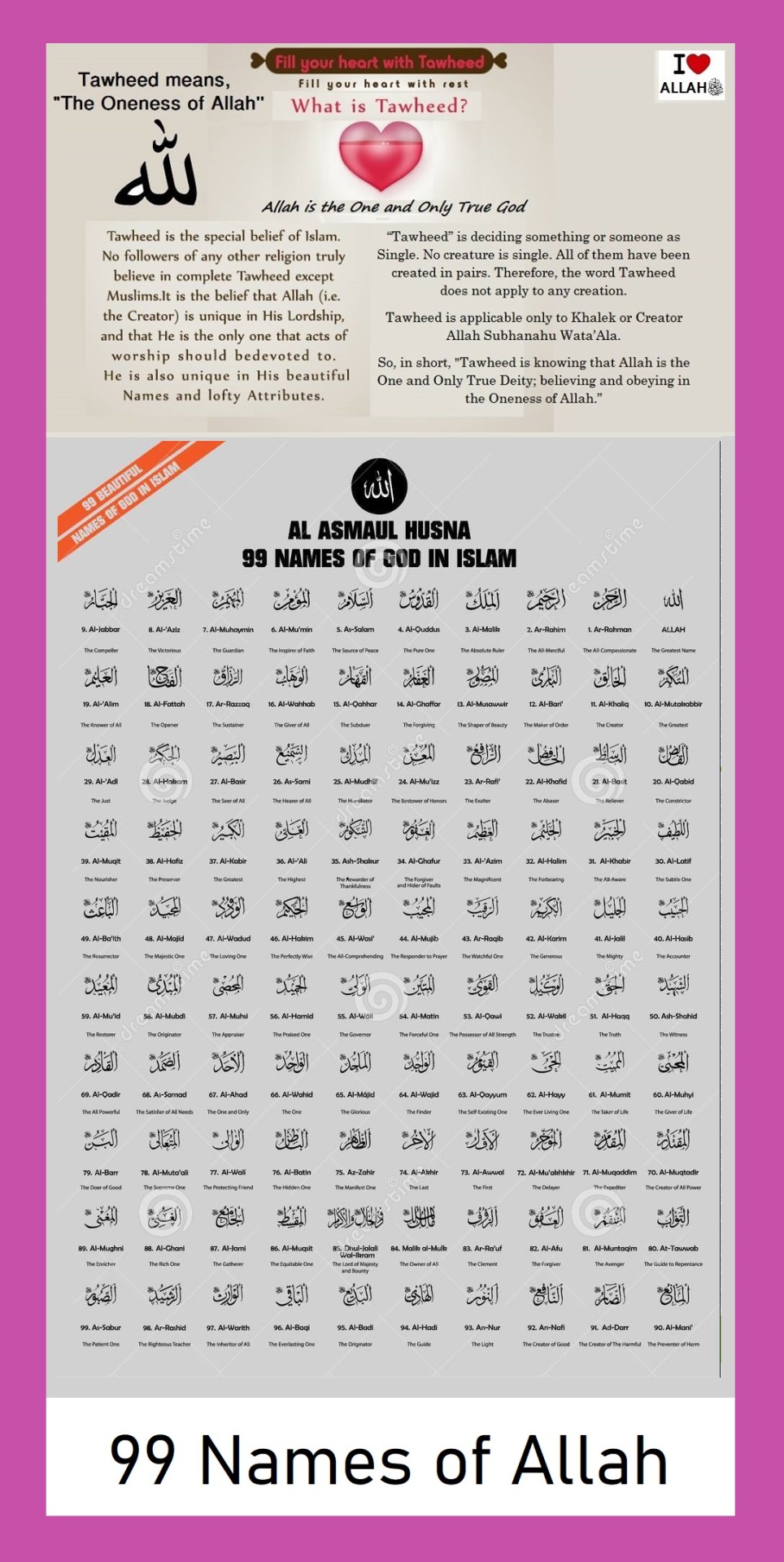
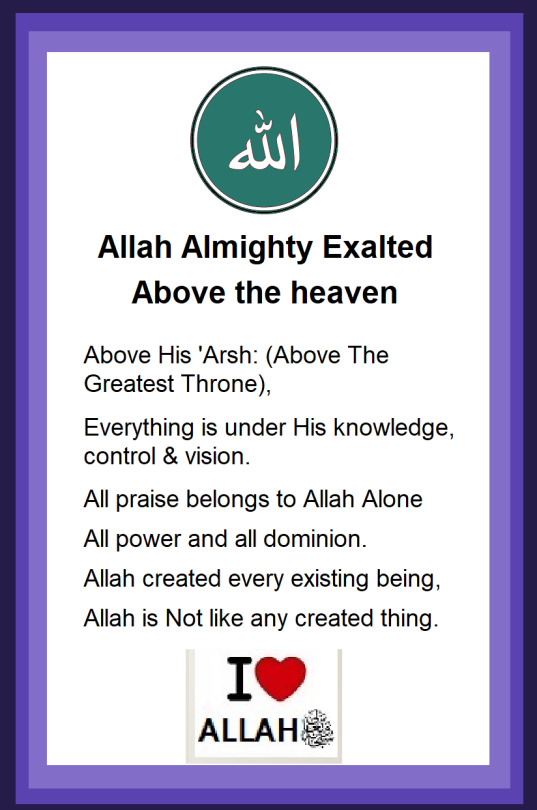
Allah is the only supreme being
He is not like anything.
Who is Allah?
Allah Is the one and only true God
The One true God is a reflection of the unique concept that Islam associates with God. To a Muslim Allah is the Almighty, Creator and Sustainer of the universe, Who is similar to nothing and nothing is comparable to Him.
Allah described in the Quran:
"He is Allah, the one and only God," means that He is "the Eternal and the Absolute," and that, "He begot none nor was He begotten," and that "there is none comparable to Him." But the Qur'an states it all in detail for more emphasis and clarification.
Allah's Identity Names and Attributes
Allah:
The Only praiseworthy supreme being, real name of Almighty God.
Everything in the sky and the earth is created
Only the Creator is Allah,
In all signs of the universe
shows pure Kalima 'La ilaha illAllah'.
Allah Almighty Exalted above the sky'
above His 'Arsh the greatest throne,
There is nothing like Allah
Everything is under His power, knowledge,control and vision.
All praise belongs to Allah alone
All power and all dominion,
The beautiful name, the perfect quality belongs to Allah alone
He is the Pure and indivisible One.
Allah is the only true GOD.
Our Lord is Allah Subhanahu wa Ta'ala.. Allah is unique, almighty, the only God. Allah is the only true Lord. There is no 'True Ilah'/ 'True Deity' except Allah. Allah is One, Unique in His Actions, Lordship, Authority, and Righteousness. Allah Ta'ala is Exalted above the throne in the sky (above all creation). Allah should be known by His beautiful name 'Asmaul Husna' and perfect attributes. Allah's name is more than 99. The Qur'an is the word of Allah. ultimate guidance for mankind. Knowledge about Allah is the pillar on which Islam is completely bound.
youtube
youtube
Allah's indivisible unicity is Tawhid
Tawhid: At the centre of all Islamic belief is the belief in one God-Allah. There is no other God but Allah and there is no one comparable to Him. We will never understand Allah as His nature supersedes our limited minds. We are created by Allah but He is not Himself created. Allah is the Unique,Omnipotent and Only Deity and Creator of the universe. Our Lord is Allah SWT. There is no 'True God' / 'True Deity' except Allah. Allah is Exalted Above His ‘Arsh (Mighty Throne’). Know Allah by His Most Beautiful Names & Lofty Attributes (Asma Was Sifat). Holy Qur'an is Allah's Word. Qur'an is final revelation & guidance for mankind.
youtube
youtube
youtube
Tawheed - The first call of the Messengers
Tawheed is to knowing, believing, declaring, obeying the oneness and uniqueness of Allah. The Oneness of Allah i.e. Tawheed consists of three parts. (i) Tawheed ar-Rububiyyah (Maintaining the Oneness of Allah's Lordship). (ii) Tawheed al-Asma-Was-Sifat (Maintaining the Oneness of Allah's Names and Attributes). (iii) Tawheed al-Ibadah (maintaining unity of worship). Allah is the only 'true Lord'. In all matters related to Allah, Allah is One, Sole, Final, Perfect and without partners. He has no peer or equivalent. Allah is to be known by His most beautiful Names and Perfect Attributes. From the first man and the first Prophet Adam (a.s.) to the last Prophet Muhammad, may Allah bless him and grant him peace, the basic call of all prophets and messengers was 'La ilaha illAllah' (there is no 'true God' but Allah). Namely: 'La Ilaha IllAllah Adamu Shafiullah'', 'La Ilaha IllAllah Nuhun Naziullah'', 'La Ilaha IllAllah Ibrahim Khalilullah', 'La Ilaha IllAllah Muhammadur Rasulullah'. Rejecting Taghut is the root of Tawheed.
youtube
Allah's indivisible unicity is Tawhid
Tawhid: At the centre of all Islamic belief is the belief in one God-Allah. There is no other God but Allah and there is no one comparable to Him. We will never understand Allah as His nature supersedes our limited minds. We are created by Allah but He is not Himself created. Allah is the Unique,Omnipotent and Only Deity and Creator of the universe. Our Lord is Allah SWT. There is no 'True God' / 'True Deity' except Allah. Allah is Exalted Above His ‘Arsh (Mighty Throne’). Know Allah by His Most Beautiful Names & Lofty Attributes (Asma Was Sifat). Holy Qur'an is Allah's Word. Qur'an is final revelation & guidance for mankind.
youtube
youtube
youtube
There is no 'true God' except Allah.
Tawheed is to knowing, believing, declaring, obeying the oneness and uniqueness of Allah. The Oneness of Allah i.e. Tawheed consists of three parts. (i) Tawheed ar-Rububiyyah (Maintaining the Oneness of Allah's Lordship). (ii) Tawheed al-Asma-Was-Sifat (Maintaining the Oneness of Allah's Names and Attributes). (iii) Tawheed al-Ibadah (maintaining unity of worship). Allah is the only 'true Lord'. In all matters related to Allah, Allah is One, Sole, Final, Perfect and without partners. He has no peer or equivalent. Allah is to be known by His most beautiful Names and Perfect Attributes. From the first man and the first Prophet Adam (a.s.) to the last Prophet Muhammad, may Allah bless him and grant him peace, the basic call of all prophets and messengers was 'La ilaha illAllah' (there is no 'true God' but Allah). Namely: 'La Ilaha IllAllah Adamu Shafiullah'', 'La Ilaha IllAllah Nuhun Naziullah'', 'La Ilaha IllAllah Ibrahim Khalilullah', 'La Ilaha IllAllah Muhammadur Rasulullah'.
Tawheed - The first call of the Messengers Rejecting Taghut is the root of Tawheed.
youtube
#Allah is the only true God
Allah's indivisible unicity is Tawhid
There is no 'true God' except Allah.
Allah's indivisible unicity is Tawhid
Rejecting Taghut is the root of Tawheed.
According to the Qur'an, God (Allah) is omniscient; he eternally knows whatever comes into being, be it universal or particular in character. He has known all things from before the creation of the world. His knowledge of things before their coming into existence and afterwards is exactly the same.
Allah is the only true GOD.
#WhoIsAllah#Allah is the only true GOD.#ALLAH#AlAhad#LailahaillAllah#Monotheism#TAWHEED#Tawhid#Tauhid#Touhid#Allah'soneness#Allah'snature#WhoisAllah#TrueGOD#TrueDeity#TrueRabb#GOD#DEITY#ALLAHSWT#ALLAHMeanings#Asmawassifat#Asmaalhusna#99NamesofAllah#99Names#Allah'sNature#Allah'sNames#Allah'sAttrributes#Allah'sQualities#Allah'sdefinition#TrueGod
0 notes
Text



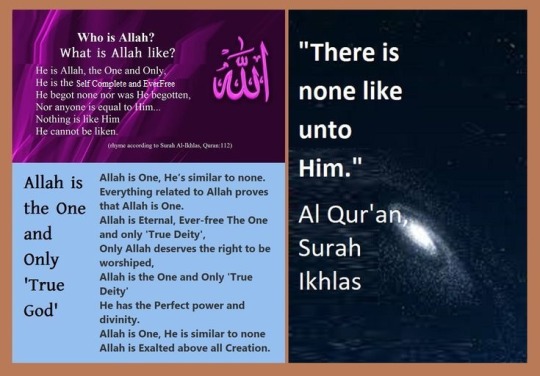
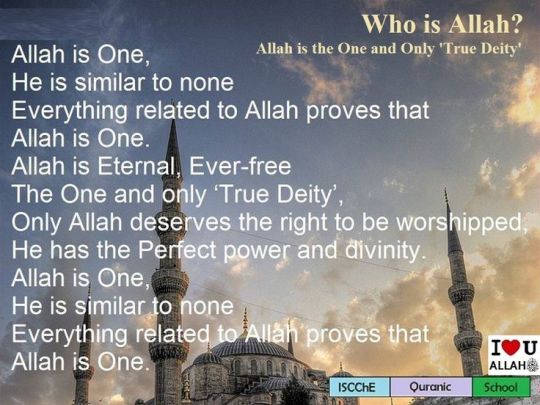
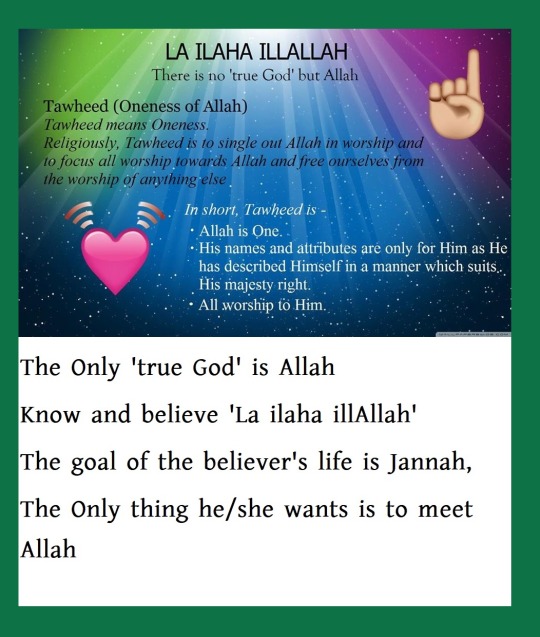
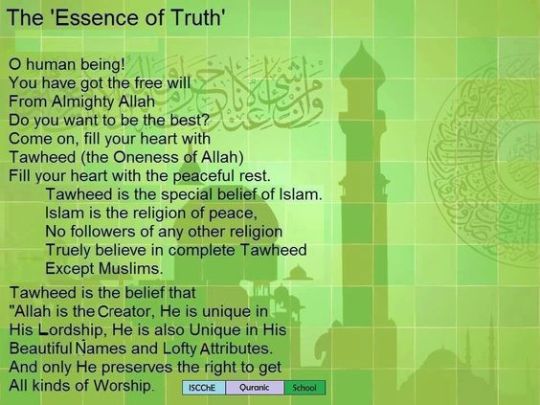
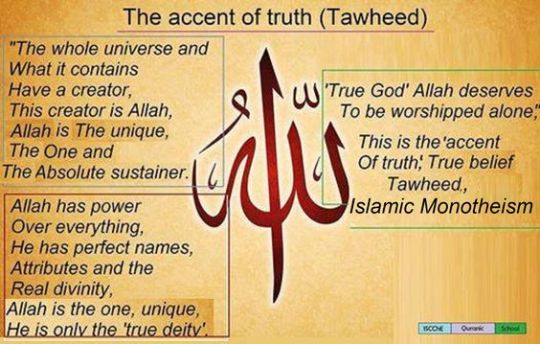


Allah is the only supreme being
He is not like anything.
Who is Allah?
Allah Is the one and only true God
The One true God is a reflection of the unique concept that Islam associates with God. To a Muslim Allah is the Almighty, Creator and Sustainer of the universe, Who is similar to nothing and nothing is comparable to Him.
Allah described in the Quran:
"He is Allah, the one and only God," means that He is "the Eternal and the Absolute," and that, "He begot none nor was He begotten," and that "there is none comparable to Him." But the Qur'an states it all in detail for more emphasis and clarification.
Allah's Identity Names and Attributes
Allah:
The Only praiseworthy supreme being, real name of Almighty God.
Everything in the sky and the earth is created
Only the Creator is Allah,
In all signs of the universe
shows pure Kalima 'La ilaha illAllah'.
Allah Almighty Exalted above the sky'
above His 'Arsh the greatest throne,
There is nothing like Allah
Everything is under His power, knowledge,control and vision.
All praise belongs to Allah alone
All power and all dominion,
The beautiful name, the perfect quality belongs to Allah alone
He is the Pure and indivisible One.
Allah is the only true GOD.
Our Lord is Allah Subhanahu wa Ta'ala.. Allah is unique, almighty, the only God. Allah is the only true Lord. There is no 'True Ilah'/ 'True Deity' except Allah. Allah is One, Unique in His Actions, Lordship, Authority, and Righteousness. Allah Ta'ala is Exalted above the throne in the sky (above all creation). Allah should be known by His beautiful name 'Asmaul Husna' and perfect attributes. Allah's name is more than 99. The Qur'an is the word of Allah. ultimate guidance for mankind. Knowledge about Allah is the pillar on which Islam is completely bound.
youtube
youtube
Allah's indivisible unicity is Tawhid
Tawhid: At the centre of all Islamic belief is the belief in one God-Allah. There is no other God but Allah and there is no one comparable to Him. We will never understand Allah as His nature supersedes our limited minds. We are created by Allah but He is not Himself created. Allah is the Unique,Omnipotent and Only Deity and Creator of the universe. Our Lord is Allah SWT. There is no 'True God' / 'True Deity' except Allah. Allah is Exalted Above His ‘Arsh (Mighty Throne’). Know Allah by His Most Beautiful Names & Lofty Attributes (Asma Was Sifat). Holy Qur'an is Allah's Word. Qur'an is final revelation & guidance for mankind.
youtube
youtube
youtube
Tawheed - The first call of the Messengers
Tawheed is to knowing, believing, declaring, obeying the oneness and uniqueness of Allah. The Oneness of Allah i.e. Tawheed consists of three parts. (i) Tawheed ar-Rububiyyah (Maintaining the Oneness of Allah's Lordship). (ii) Tawheed al-Asma-Was-Sifat (Maintaining the Oneness of Allah's Names and Attributes). (iii) Tawheed al-Ibadah (maintaining unity of worship). Allah is the only 'true Lord'. In all matters related to Allah, Allah is One, Sole, Final, Perfect and without partners. He has no peer or equivalent. Allah is to be known by His most beautiful Names and Perfect Attributes. From the first man and the first Prophet Adam (a.s.) to the last Prophet Muhammad, may Allah bless him and grant him peace, the basic call of all prophets and messengers was 'La ilaha illAllah' (there is no 'true God' but Allah). Namely: 'La Ilaha IllAllah Adamu Shafiullah'', 'La Ilaha IllAllah Nuhun Naziullah'', 'La Ilaha IllAllah Ibrahim Khalilullah', 'La Ilaha IllAllah Muhammadur Rasulullah'. Rejecting Taghut is the root of Tawheed.
youtube
Allah's indivisible unicity is Tawhid
Tawhid: At the centre of all Islamic belief is the belief in one God-Allah. There is no other God but Allah and there is no one comparable to Him. We will never understand Allah as His nature supersedes our limited minds. We are created by Allah but He is not Himself created. Allah is the Unique,Omnipotent and Only Deity and Creator of the universe. Our Lord is Allah SWT. There is no 'True God' / 'True Deity' except Allah. Allah is Exalted Above His ‘Arsh (Mighty Throne’). Know Allah by His Most Beautiful Names & Lofty Attributes (Asma Was Sifat). Holy Qur'an is Allah's Word. Qur'an is final revelation & guidance for mankind.
youtube
youtube
youtube
There is no 'true God' except Allah.
Tawheed is to knowing, believing, declaring, obeying the oneness and uniqueness of Allah. The Oneness of Allah i.e. Tawheed consists of three parts. (i) Tawheed ar-Rububiyyah (Maintaining the Oneness of Allah's Lordship). (ii) Tawheed al-Asma-Was-Sifat (Maintaining the Oneness of Allah's Names and Attributes). (iii) Tawheed al-Ibadah (maintaining unity of worship). Allah is the only 'true Lord'. In all matters related to Allah, Allah is One, Sole, Final, Perfect and without partners. He has no peer or equivalent. Allah is to be known by His most beautiful Names and Perfect Attributes. From the first man and the first Prophet Adam (a.s.) to the last Prophet Muhammad, may Allah bless him and grant him peace, the basic call of all prophets and messengers was 'La ilaha illAllah' (there is no 'true God' but Allah). Namely: 'La Ilaha IllAllah Adamu Shafiullah'', 'La Ilaha IllAllah Nuhun Naziullah'', 'La Ilaha IllAllah Ibrahim Khalilullah', 'La Ilaha IllAllah Muhammadur Rasulullah'.
Tawheed - The first call of the Messengers Rejecting Taghut is the root of Tawheed.
youtube
Allah is the only true God
Allah's indivisible unicity is Tawhid
There is no 'true God' except Allah.
Allah's indivisible unicity is Tawhid
Rejecting Taghut is the root of Tawheed.
According to the Qur'an, God (Allah) is omniscient; he eternally knows whatever comes into being, be it universal or particular in character. He has known all things from before the creation of the world. His knowledge of things before their coming into existence and afterwards is exactly the same.
Allah is the only true GOD.
#Allahswt#Allah is the only true GOD.#ALLAH#AlAhad#LailahaillAllah#Monotheism#TAWHEED#Tawhid#Tauhid#Touhid#Allah'soneness#Allah'snature#WhoisAllah#TrueGOD#TrueDeity#TrueRabb#GOD#DEITY#ALLAHSWT#ALLAHMeanings#Asmawassifat#Asmaalhusna#99NamesofAllah#99Names#Allah'sNature#Allah'sNames#Allah'sAttrributes#Allah'sQualities#Allah'sdefinition#TrueGod
0 notes
Text
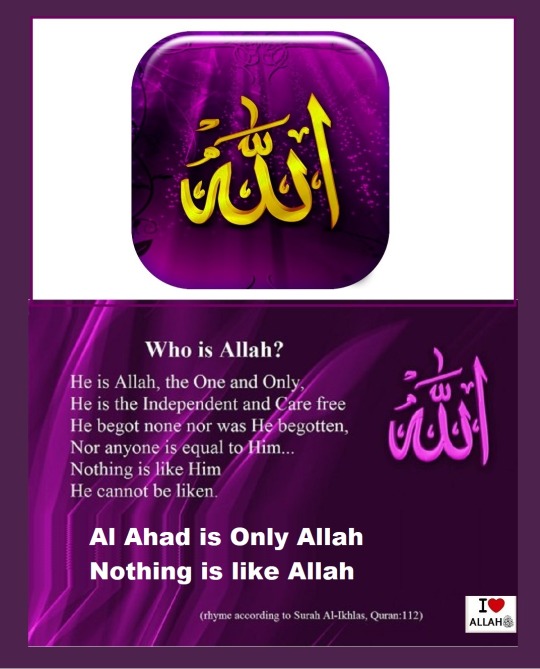



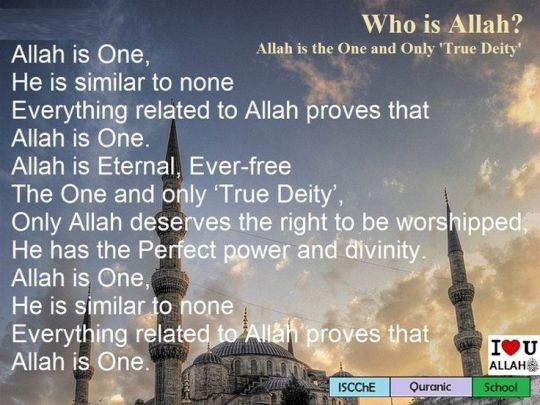


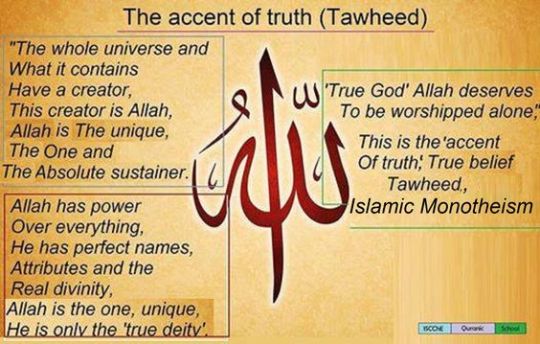
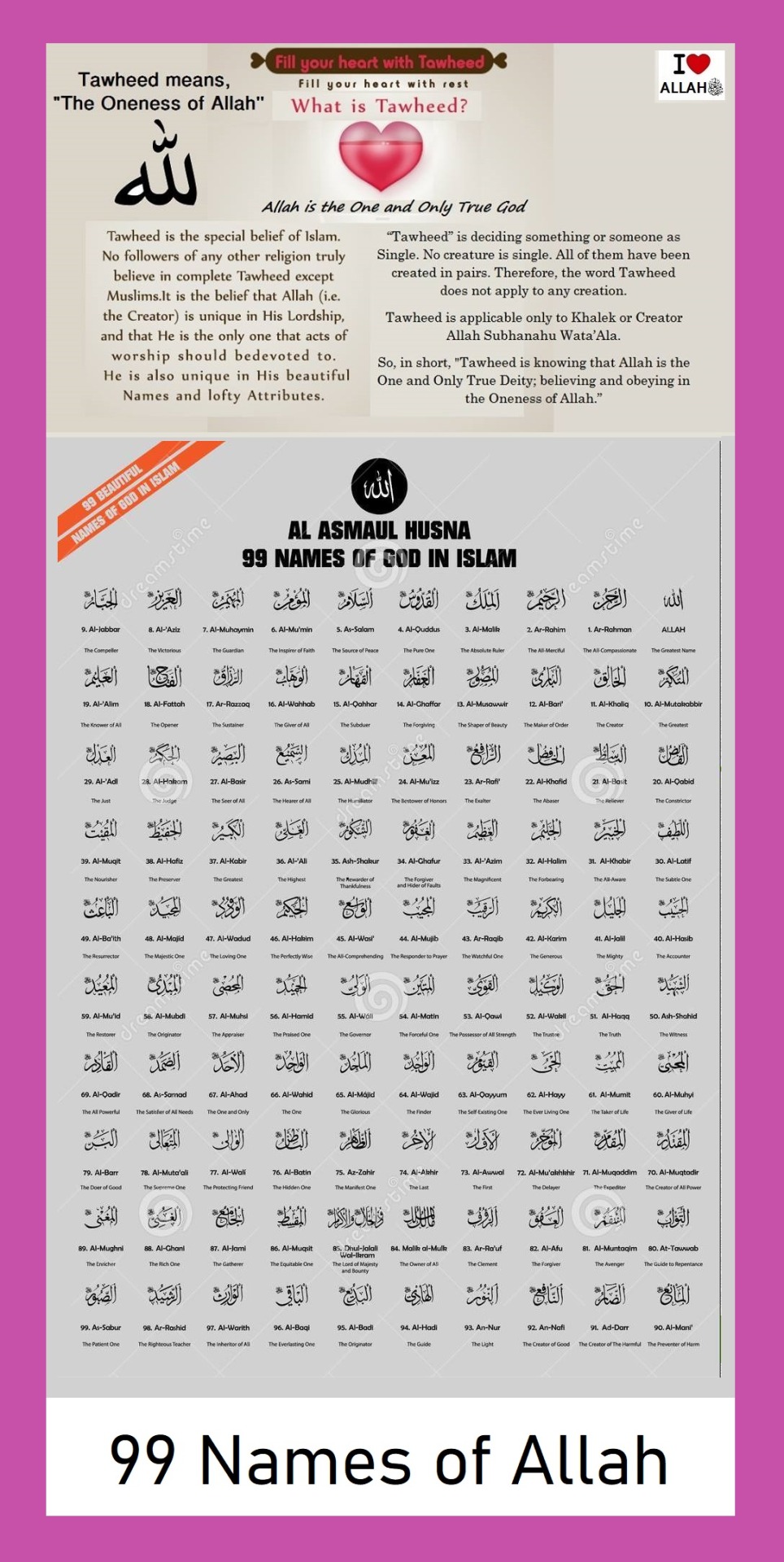

Allah is the only supreme being
He is not like anything.
Who is Allah?
Allah Is the one and only true God
The One true God is a reflection of the unique concept that Islam associates with God. To a Muslim Allah is the Almighty, Creator and Sustainer of the universe, Who is similar to nothing and nothing is comparable to Him.
Allah described in the Quran:
"He is Allah, the one and only God," means that He is "the Eternal and the Absolute," and that, "He begot none nor was He begotten," and that "there is none comparable to Him." But the Qur'an states it all in detail for more emphasis and clarification.
Allah's Identity Names and Attributes
Allah:
The Only praiseworthy supreme being, real name of Almighty God.
Everything in the sky and the earth is created
Only the Creator is Allah,
In all signs of the universe
shows pure Kalima 'La ilaha illAllah'.
Allah Almighty Exalted above the sky'
above His 'Arsh the greatest throne,
There is nothing like Allah
Everything is under His power, knowledge,control and vision.
All praise belongs to Allah alone
All power and all dominion,
The beautiful name, the perfect quality belongs to Allah alone
He is the Pure and indivisible One.
Allah is the only true GOD.
Our Lord is Allah Subhanahu wa Ta'ala.. Allah is unique, almighty, the only God. Allah is the only true Lord. There is no 'True Ilah'/ 'True Deity' except Allah. Allah is One, Unique in His Actions, Lordship, Authority, and Righteousness. Allah Ta'ala is Exalted above the throne in the sky (above all creation). Allah should be known by His beautiful name 'Asmaul Husna' and perfect attributes. Allah's name is more than 99. The Qur'an is the word of Allah. ultimate guidance for mankind. Knowledge about Allah is the pillar on which Islam is completely bound.
youtube
youtube
Allah's indivisible unicity is Tawhid
Tawhid: At the centre of all Islamic belief is the belief in one God-Allah. There is no other God but Allah and there is no one comparable to Him. We will never understand Allah as His nature supersedes our limited minds. We are created by Allah but He is not Himself created. Allah is the Unique,Omnipotent and Only Deity and Creator of the universe. Our Lord is Allah SWT. There is no 'True God' / 'True Deity' except Allah. Allah is Exalted Above His ‘Arsh (Mighty Throne’). Know Allah by His Most Beautiful Names & Lofty Attributes (Asma Was Sifat). Holy Qur'an is Allah's Word. Qur'an is final revelation & guidance for mankind.
youtube
youtube
youtube
Tawheed - The first call of the Messengers
Tawheed is to knowing, believing, declaring, obeying the oneness and uniqueness of Allah. The Oneness of Allah i.e. Tawheed consists of three parts. (i) Tawheed ar-Rububiyyah (Maintaining the Oneness of Allah's Lordship). (ii) Tawheed al-Asma-Was-Sifat (Maintaining the Oneness of Allah's Names and Attributes). (iii) Tawheed al-Ibadah (maintaining unity of worship). Allah is the only 'true Lord'. In all matters related to Allah, Allah is One, Sole, Final, Perfect and without partners. He has no peer or equivalent. Allah is to be known by His most beautiful Names and Perfect Attributes. From the first man and the first Prophet Adam (a.s.) to the last Prophet Muhammad, may Allah bless him and grant him peace, the basic call of all prophets and messengers was 'La ilaha illAllah' (there is no 'true God' but Allah). Namely: 'La Ilaha IllAllah Adamu Shafiullah'', 'La Ilaha IllAllah Nuhun Naziullah'', 'La Ilaha IllAllah Ibrahim Khalilullah', 'La Ilaha IllAllah Muhammadur Rasulullah'. Rejecting Taghut is the root of Tawheed.
youtube
Allah's indivisible unicity is Tawhid
Tawhid: At the centre of all Islamic belief is the belief in one God-Allah. There is no other God but Allah and there is no one comparable to Him. We will never understand Allah as His nature supersedes our limited minds. We are created by Allah but He is not Himself created. Allah is the Unique,Omnipotent and Only Deity and Creator of the universe. Our Lord is Allah SWT. There is no 'True God' / 'True Deity' except Allah. Allah is Exalted Above His ‘Arsh (Mighty Throne’). Know Allah by His Most Beautiful Names & Lofty Attributes (Asma Was Sifat). Holy Qur'an is Allah's Word. Qur'an is final revelation & guidance for mankind.
youtube
youtube
youtube
There is no 'true God' except Allah.
Tawheed is to knowing, believing, declaring, obeying the oneness and uniqueness of Allah. The Oneness of Allah i.e. Tawheed consists of three parts. (i) Tawheed ar-Rububiyyah (Maintaining the Oneness of Allah's Lordship). (ii) Tawheed al-Asma-Was-Sifat (Maintaining the Oneness of Allah's Names and Attributes). (iii) Tawheed al-Ibadah (maintaining unity of worship). Allah is the only 'true Lord'. In all matters related to Allah, Allah is One, Sole, Final, Perfect and without partners. He has no peer or equivalent. Allah is to be known by His most beautiful Names and Perfect Attributes. From the first man and the first Prophet Adam (a.s.) to the last Prophet Muhammad, may Allah bless him and grant him peace, the basic call of all prophets and messengers was 'La ilaha illAllah' (there is no 'true God' but Allah). Namely: 'La Ilaha IllAllah Adamu Shafiullah'', 'La Ilaha IllAllah Nuhun Naziullah'', 'La Ilaha IllAllah Ibrahim Khalilullah', 'La Ilaha IllAllah Muhammadur Rasulullah'.
Tawheed - The first call of the Messengers Rejecting Taghut is the root of Tawheed.
youtube
Allah is the only true God
Allah's indivisible unicity is Tawhid
There is no 'true God' except Allah.
Allah's indivisible unicity is Tawhid
Rejecting Taghut is the root of Tawheed.
According to the Qur'an, God (Allah) is omniscient; he eternally knows whatever comes into being, be it universal or particular in character. He has known all things from before the creation of the world. His knowledge of things before their coming into existence and afterwards is exactly the same.
Allah is the only true GOD.
#WhoIsAllah#Allah is the only true GOD.#ALLAH#AlAhad#LailahaillAllah#Monotheism#TAWHEED#Tawhid#Tauhid#Touhid#Allah'soneness#Allah'snature#WhoisAllah#TrueGOD#TrueDeity#TrueRabb#GOD#DEITY#ALLAHSWT#ALLAHMeanings#Asmawassifat#Asmaalhusna#99NamesofAllah#99Names#Allah'sNature#Allah'sNames#Allah'sAttrributes#Allah'sQualities#Allah'sdefinition#TrueGod
1 note
·
View note
Text

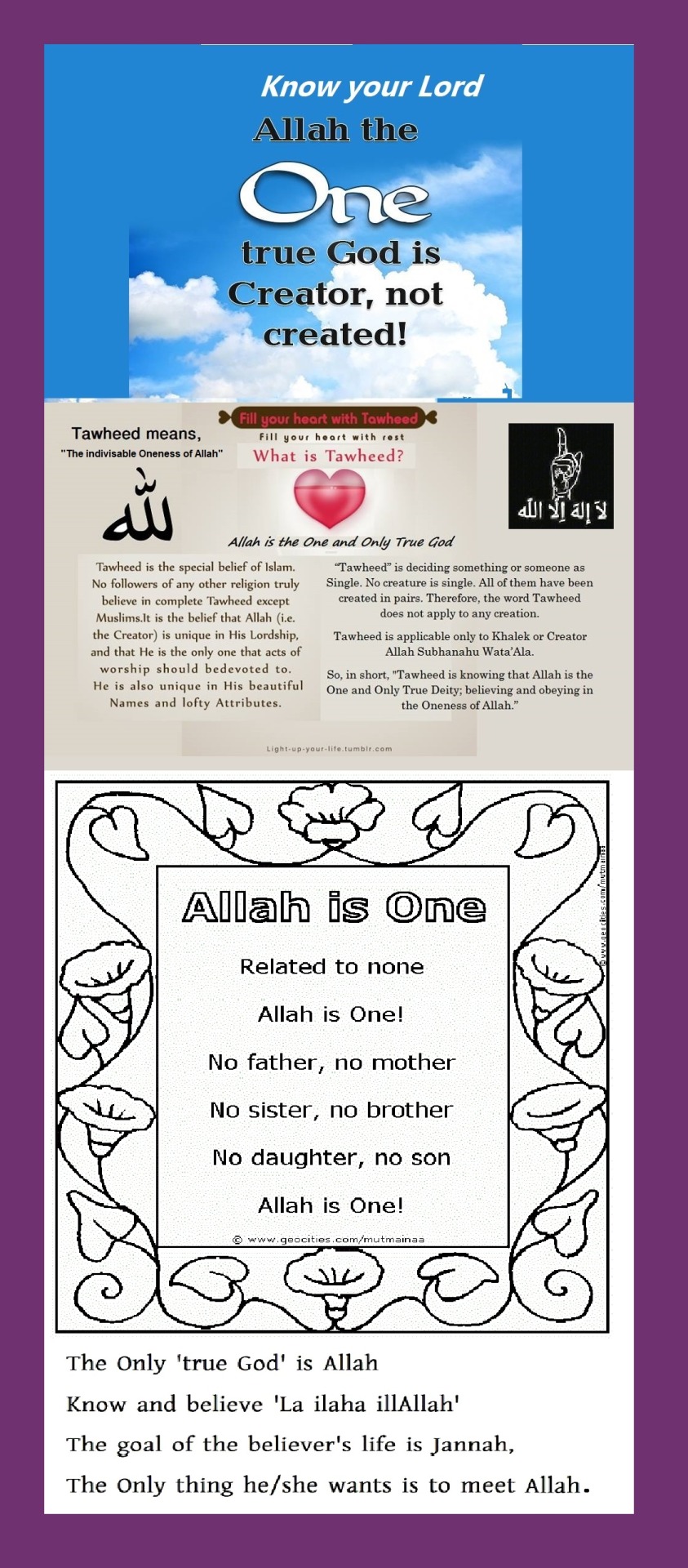
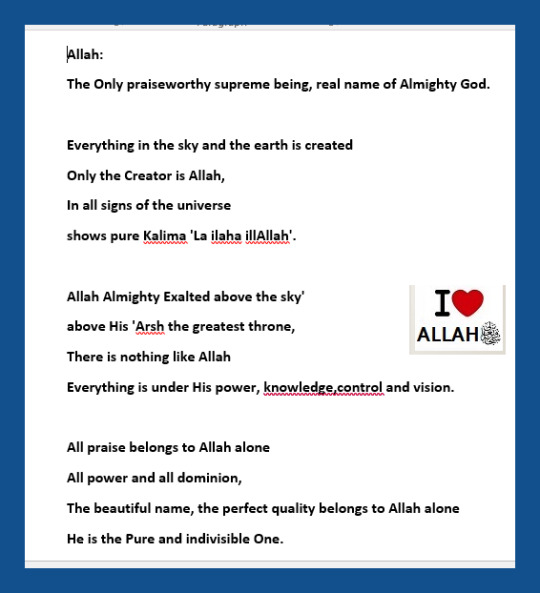
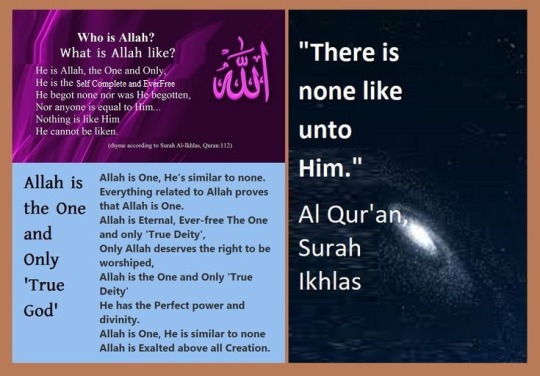
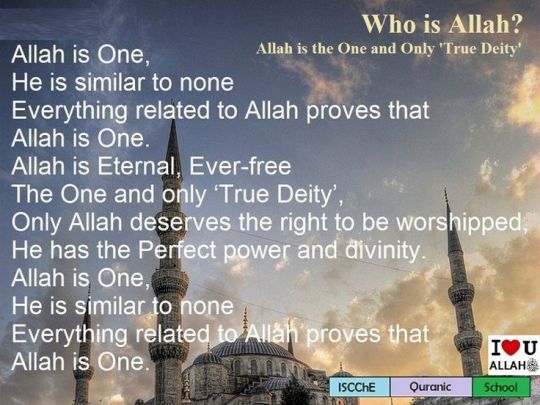

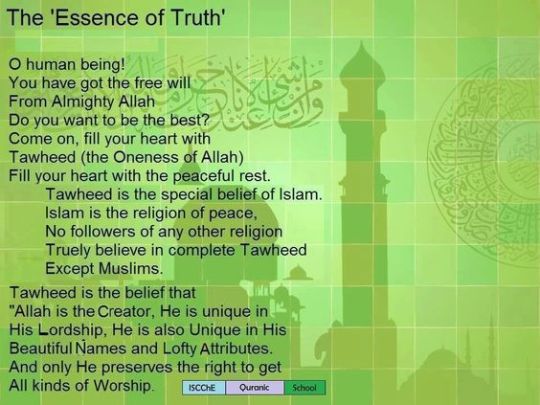
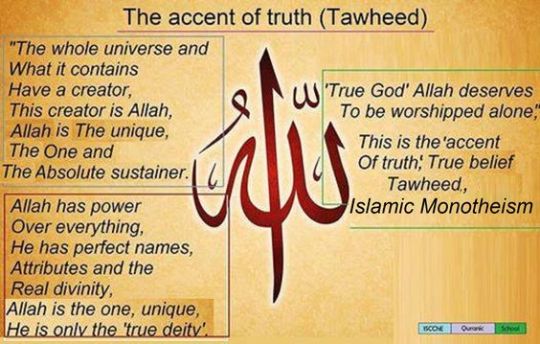


Allah is the only supreme being
He is not like anything.
Who is Allah?
Allah Is the one and only true God
The One true God is a reflection of the unique concept that Islam associates with God. To a Muslim Allah is the Almighty, Creator and Sustainer of the universe, Who is similar to nothing and nothing is comparable to Him.
Allah described in the Quran:
"He is Allah, the one and only God," means that He is "the Eternal and the Absolute," and that, "He begot none nor was He begotten," and that "there is none comparable to Him." But the Qur'an states it all in detail for more emphasis and clarification.
Allah's Identity Names and Attributes
Allah:
The Only praiseworthy supreme being, real name of Almighty God.
Everything in the sky and the earth is created
Only the Creator is Allah,
In all signs of the universe
shows pure Kalima 'La ilaha illAllah'.
Allah Almighty Exalted above the sky'
above His 'Arsh the greatest throne,
There is nothing like Allah
Everything is under His power, knowledge,control and vision.
All praise belongs to Allah alone
All power and all dominion,
The beautiful name, the perfect quality belongs to Allah alone
He is the Pure and indivisible One.
Allah is the only true GOD.
Our Lord is Allah Subhanahu wa Ta'ala.. Allah is unique, almighty, the only God. Allah is the only true Lord. There is no 'True Ilah'/ 'True Deity' except Allah. Allah is One, Unique in His Actions, Lordship, Authority, and Righteousness. Allah Ta'ala is Exalted above the throne in the sky (above all creation). Allah should be known by His beautiful name 'Asmaul Husna' and perfect attributes. Allah's name is more than 99. The Qur'an is the word of Allah. ultimate guidance for mankind. Knowledge about Allah is the pillar on which Islam is completely bound.
youtube
youtube
Allah's indivisible unicity is Tawhid
Tawhid: At the centre of all Islamic belief is the belief in one God-Allah. There is no other God but Allah and there is no one comparable to Him. We will never understand Allah as His nature supersedes our limited minds. We are created by Allah but He is not Himself created. Allah is the Unique,Omnipotent and Only Deity and Creator of the universe. Our Lord is Allah SWT. There is no 'True God' / 'True Deity' except Allah. Allah is Exalted Above His ‘Arsh (Mighty Throne’). Know Allah by His Most Beautiful Names & Lofty Attributes (Asma Was Sifat). Holy Qur'an is Allah's Word. Qur'an is final revelation & guidance for mankind.
youtube
youtube
youtube
Tawheed - The first call of the Messengers
Tawheed is to knowing, believing, declaring, obeying the oneness and uniqueness of Allah. The Oneness of Allah i.e. Tawheed consists of three parts. (i) Tawheed ar-Rububiyyah (Maintaining the Oneness of Allah's Lordship). (ii) Tawheed al-Asma-Was-Sifat (Maintaining the Oneness of Allah's Names and Attributes). (iii) Tawheed al-Ibadah (maintaining unity of worship). Allah is the only 'true Lord'. In all matters related to Allah, Allah is One, Sole, Final, Perfect and without partners. He has no peer or equivalent. Allah is to be known by His most beautiful Names and Perfect Attributes. From the first man and the first Prophet Adam (a.s.) to the last Prophet Muhammad, may Allah bless him and grant him peace, the basic call of all prophets and messengers was 'La ilaha illAllah' (there is no 'true God' but Allah). Namely: 'La Ilaha IllAllah Adamu Shafiullah'', 'La Ilaha IllAllah Nuhun Naziullah'', 'La Ilaha IllAllah Ibrahim Khalilullah', 'La Ilaha IllAllah Muhammadur Rasulullah'. Rejecting Taghut is the root of Tawheed.
youtube
Allah's indivisible unicity is Tawhid
Tawhid: At the centre of all Islamic belief is the belief in one God-Allah. There is no other God but Allah and there is no one comparable to Him. We will never understand Allah as His nature supersedes our limited minds. We are created by Allah but He is not Himself created. Allah is the Unique,Omnipotent and Only Deity and Creator of the universe. Our Lord is Allah SWT. There is no 'True God' / 'True Deity' except Allah. Allah is Exalted Above His ‘Arsh (Mighty Throne’). Know Allah by His Most Beautiful Names & Lofty Attributes (Asma Was Sifat). Holy Qur'an is Allah's Word. Qur'an is final revelation & guidance for mankind.
youtube
youtube
youtube
There is no 'true God' except Allah.
Tawheed is to knowing, believing, declaring, obeying the oneness and uniqueness of Allah. The Oneness of Allah i.e. Tawheed consists of three parts. (i) Tawheed ar-Rububiyyah (Maintaining the Oneness of Allah's Lordship). (ii) Tawheed al-Asma-Was-Sifat (Maintaining the Oneness of Allah's Names and Attributes). (iii) Tawheed al-Ibadah (maintaining unity of worship). Allah is the only 'true Lord'. In all matters related to Allah, Allah is One, Sole, Final, Perfect and without partners. He has no peer or equivalent. Allah is to be known by His most beautiful Names and Perfect Attributes. From the first man and the first Prophet Adam (a.s.) to the last Prophet Muhammad, may Allah bless him and grant him peace, the basic call of all prophets and messengers was 'La ilaha illAllah' (there is no 'true God' but Allah). Namely: 'La Ilaha IllAllah Adamu Shafiullah'', 'La Ilaha IllAllah Nuhun Naziullah'', 'La Ilaha IllAllah Ibrahim Khalilullah', 'La Ilaha IllAllah Muhammadur Rasulullah'.
Tawheed - The first call of the Messengers Rejecting Taghut is the root of Tawheed.
youtube
Allah is the only true God
Allah's indivisible unicity is Tawhid
There is no 'true God' except Allah.
Allah's indivisible unicity is Tawhid
Rejecting Taghut is the root of Tawheed.
According to the Qur'an, God (Allah) is omniscient; he eternally knows whatever comes into being, be it universal or particular in character. He has known all things from before the creation of the world. His knowledge of things before their coming into existence and afterwards is exactly the same.
Allah is the only true GOD.
#Allahswt#Allah is the only true GOD.#ALLAH#AlAhad#LailahaillAllah#Monotheism#TAWHEED#Tawhid#Tauhid#Touhid#Allah'soneness#Allah'snature#WhoisAllah#TrueGOD#TrueDeity#TrueRabb#GOD#DEITY#ALLAHSWT#ALLAHMeanings#Asmawassifat#Asmaalhusna#99NamesofAllah#99Names#Allah'sNature#Allah'sNames#Allah'sAttrributes#Allah'sQualities#Allah'sdefinition#TrueGod
1 note
·
View note
Text
Discovering the Divine: Exploring the 99 Names of Allah
In the tapestry of the Islamic faith, the 99 Names of Allah, also known as Asma ul Husna, weave a rich and profound narrative of the Divine. Each name encapsulates a unique attribute, a facet of Allah's infinite greatness and mercy, offering believers a glimpse into the boundless majesty of their Creator. From the compassionate Al-Rahman to the merciful Al-Ghafoor, these names are more than mere words; they are portals through which believers deepen their connection with Allah.
Understanding the Significance
At the heart of Islamic theology lies the belief in the oneness of Allah. The 99 Names serve as a testament to this unity, illustrating the multifaceted nature of the Divine. Through contemplation and recitation of these names, Muslims seek to develop a deeper understanding of Allah's attributes and draw closer to Him in reverence and devotion.
The Journey of Discovery
Embarking on a journey to explore the 99 Names is an invitation to delve into the essence of Allah Himself. Each name holds profound meaning and significance, offering insights into His benevolence, wisdom, and power. For instance, Al-Wadud, the Loving, reminds believers of Allah's boundless affection and care for His creation, while Al-Alim, the All-Knowing, underscores His infinite wisdom and knowledge.
Nurturing the Soul
Studying the 99 Names is not merely an intellectual pursuit but a spiritual practice that nourishes the soul. As believers reflect on each name and its implications, they cultivate a deeper appreciation for Allah's attributes and their manifestation in the world around them. This introspective journey fosters humility, gratitude, and a profound sense of awe in the presence of the Divine.
Learning from Bisma Online Quran Academy
For those eager to deepen their understanding of the Quran and its teachings, Bisma Online Quran Academy offers a comprehensive platform for learning. With experienced tutors and personalized learning plans, students can explore the intricacies of Islamic theology, including the profound significance of the 99 Names of Allah.
Bisma Online Quran Academy provides a nurturing environment where students can engage with the Quran at their own pace, fostering a deeper connection with their faith. Through interactive lessons and guided study, learners gain insights into the spiritual depth of the 99 Names and their relevance in everyday life.

Incorporating the Names into Daily Life
As believers immerse themselves in the study of the 99 Names, they are encouraged to incorporate these divine attributes into their daily lives. Whether through supplication, reflection, or acts of kindness, the names serve as a guide for cultivating virtues and aligning one's actions with the values espoused by Islam.
Strengthening Faith and Resilience
In times of trial and tribulation, the 99 Names serve as a source of solace and strength for believers. By invoking Allah through His various names, Muslims find reassurance in His mercy, compassion, and guidance. This deepens their faith and resilience, enabling them to navigate life's challenges with patience and trust in the Divine plan.
Embracing Diversity and Unity
The 99 Names of Allah transcend cultural and linguistic boundaries, uniting Muslims around the world in their reverence for the Divine. Regardless of nationality or background, believers find common ground in their devotion to Allah and His attributes. This unity in diversity is a testament to the universal message of Islam, which celebrates the inherent dignity and worth of all human beings.
Conclusion
The 99 Names of Allah are a profound expression of Islamic theology, encapsulating the boundless majesty and mercy of the Divine. Through contemplation and reflection, believers deepen their understanding of Allah's attributes and cultivate a closer relationship with Him. Bisma Online Quran Academy offers a valuable resource for those seeking to explore the significance of the 99 Names and enrich their spiritual journey. As believers incorporate these divine attributes into their daily lives, they embody the timeless values of Islam and find strength and solace in their faith.
#online quran tutor#online quran academy#online quran classes#online quran teaching#online quran lessons#online quran academy usa#online quran teacher#99 names of allah
0 notes
Link
The Meaning of the 99 Names of Allah and Their Benefits Welcome to our comprehensive guide on the meaning of the 99 names of Allah and their benefits. In this article, we will explore the profound significance behind each of these names and how they can positively impact our lives. By understanding the essence of these names, we can deepen our connection with Allah and seek His blessings. The 99 Names of Allah Allah, the Most Merciful and the Most Compassionate has revealed 99 names in the Holy Quran that encompass His divine attributes. Each name reflects a unique aspect of His nature and serves as a reminder of His infinite power and wisdom. These names are not mere labels but hold deep spiritual significance. Ar-Rahman (The Most Gracious) Ar-Rahman signifies Allah's boundless mercy and compassion towards His creation. By invoking this name, we seek His mercy and blessings in our lives. It reminds us of His infinite love and forgiveness. Ar-Rahim (The Most Merciful) Ar-Rahim highlights Allah's continuous mercy and compassion. It emphasizes His willingness to forgive and shower His blessings upon those who seek His guidance. By understanding this name, we can find solace in His mercy and strive to be merciful towards others. Al-Malik (The Sovereign) Al-Malik represents Allah's absolute sovereignty and kingship over the entire universe. This name reminds us that He is the ultimate ruler and has complete control over all affairs. By recognizing His sovereignty, we can submit ourselves to His will and find peace in His guidance. Al-Quddus (The Holy) Al-Quddus signifies Allah's absolute purity and perfection. He is free from any imperfections or flaws. By contemplating on this name, we can strive for purity in our thoughts, actions, and intentions, and seek His divine guidance to purify our hearts. As-Salam (The Source of Peace) As-Salam represents Allah as the ultimate source of peace and tranquility. By invoking this name, we seek inner peace and harmony in our lives. It reminds us to strive for peace with ourselves, others, and the world around us. Al-Mu'min (The Guardian of Faith) Al-Mu'min signifies Allah as the guardian of faith and the One who grants security to His believers. By understanding this name, we can strengthen our faith and trust in Him, knowing that He is the ultimate protector and sustainer. Al-Muhaymin (The Protector) Al-Muhaymin represents Allah as the ultimate protector and witness of all things. He is the One who watches over His creation and ensures justice prevails. By recognizing His role as the protector, we can find solace in His care and seek His guidance in times of need. Al-Aziz (The Mighty) Al-Aziz signifies Allah's might and power. He is the One who possesses ultimate strength and authority. By contemplating this name, we can find strength and courage in our own lives, knowing that Allah is always with us. Al-Jabbar (The Compeller) Al-Jabbar represents Allah's ability to mend what is broken and restore what is lost. By invoking this name, we seek His help in overcoming our weaknesses and challenges. It reminds us that Allah has the power to heal and mend our hearts. Al-Mutakabbir (The Majestic) Al-Mutakabbir signifies Allah's greatness and majesty. He is the One who is above all and beyond any limitations. By recognizing His majesty, we can humble ourselves before Him and seek His guidance and blessings. Benefits of Understanding the 99 Names of Allah By delving into the meaning and significance of the 99 names of Allah, we can experience numerous benefits in our lives. Some of these benefits include: Strengthening our Faith Understanding the names of Allah deepens our faith and strengthens our connection with Him. It reminds us of His presence in our lives and His ability to guide and support us through every situation. Seeking His Blessings By invoking the names of Allah, we seek His blessings and mercy. Each name represents a specific attribute of Allah, and by calling upon these names, we open ourselves to His divine favors and protection. Finding Inner Peace The names of Allah remind us of His attributes of peace and tranquility. By contemplating these names, we can find inner peace and serenity, even amid life's challenges and uncertainties. Developing Virtuous Qualities Each name of Allah reflects a virtuous quality that we can strive to embody in our own lives. By understanding these names, we can develop qualities such as mercy, compassion, patience, and forgiveness. Seeking Guidance The names of Allah serve as a source of guidance for us. By reflecting on these names, we can seek His guidance in making decisions, finding solutions to our problems, and navigating through the complexities of life. Connecting with the Divine Understanding the names of Allah allows us to deepen our connection with the Divine. It reminds us of His infinite love and mercy towards His creation and encourages us to develop a closer relationship with Him through prayer, remembrance, and acts of worship. [caption id="attachment_79556" align="aligncenter" width="896"] meaning of the 99 names of Allah and benefits[/caption] The 99 names of Allah hold immense spiritual significance and offer numerous benefits to those who seek to understand and invoke them. By delving into the meaning of these names, we can strengthen our faith, seek His blessings, find inner peace, develop virtuous qualities, seek guidance, and connect with the Divine. May Allah bless us with the wisdom to comprehend and embody the essence of His beautiful names. Frequently Asked Questions 1. What are the 99 Names of Allah? The 99 Names of Allah are the various attributes and qualities that describe Allah in Islamic tradition. 2. What is the significance of knowing the 99 Names of Allah? Knowing the 99 Names of Allah helps deepen our understanding of His nature, enabling us to develop a closer relationship with Him. 3. Are the 99 Names of Allah mentioned in the Quran? Yes, the 99 Names of Allah are mentioned in various verses of the Quran, providing a divine source for their significance. 4. What are some benefits of reciting the 99 Names of Allah? Reciting the 99 Names of Allah can bring numerous benefits, such as spiritual purification, increased mindfulness, and blessings from Allah. 5. Can reciting specific Names of Allah help with specific needs? Yes, certain Names of Allah are associated with specific benefits. For example, reciting "Ar-Rahman" (The Most Gracious) can increase compassion and mercy in oneself. 6. How can I incorporate the 99 Names of Allah into my daily life? You can incorporate the 99 Names of Allah into your daily life by reciting them during prayers, reflecting on their meanings, and striving to embody their qualities in your actions. 7. Are there any recommended times or occasions to recite the 99 Names of Allah? While there are no specific times or occasions prescribed for reciting the 99 Names of Allah, you can recite them at any time that is convenient for you and when you seek a deeper connection with Allah. 8. Can non-Arabic speakers recite the 99 Names of Allah in translation? Yes, non-Arabic speakers can recite the 99 Names of Allah in translation to understand their meanings and benefit from their essence. 9. Are there any specific etiquettes or manners to observe when reciting the 99 Names of Allah? While there are no strict etiquettes, it is recommended to recite the Names of Allah with sincerity, humility, and focus, seeking to comprehend their meanings and internalize their teachings. 10. Can reciting the 99 Names of Allah protect us from harm? Reciting the 99 Names of Allah with faith and trust in Him can serve as a means of seeking protection and seeking His divine assistance in times of difficulty or danger.
#advantage#blessing#boon#connotation#definition#denotation#essence#explanation#favor#gain#implication#import#interpretation#merit#profit#purpose#sense#significance#understanding#usefulness#value
0 notes
Text
Jumu'ah Sohbet; 20 October 2023
What a topsy-turvy birthday time celebrating Yawn un-Nabi (Prophet Muhammad's SAW birthday month) towards the end of September 2023 and even Ammu's spiritually significant 40th birthday in early October 2023. Culminating to the turbulent time in the Muslim world, starting with Bangladesh, Pakistan, Afghanistan, Iraq, Yemen, Syria, even Sudan of Africa - the country where your Uncle Bashir and Aunty Amira are from - and ending with the recent destruction of the Palestinians of Gaza. We will reflect on what it means as an ummah (Muslim community) and the ways that we can approach it. Bismillah...
#1. We began reflecting with Shaykh Nishaat's micro-world of his family's journey from India at the end of WWII in 1942 to South Africa, which underwent its own political transformation from apartheid to democracy. It reminded me how your own Nana (maternal Grandpa) was a freedom fighter in the successful liberation of Bangladesh from Pakistan, a country that is still warring within itself.
They have all made me reflect how humanity generally has been progressively going through upheaval and how the inner focus of warring one's nafs is just as turbulent and rewarding as the outer battles that we face. Here Shaykh Nishaat rightly reflected that we celebrated the end of apartheid, but things still continue to fall apart. We human beings need to get a grip of our egos. We are consumed with greed, lust, anger, jealousy, and pride. Why is it so hard for us to be Muslim?! We have the best example in the Prophet PBUH, but do we show that? We have to first look at ourselves. Are we reflecting the 99 names of Allah?, and one of His names is the Just.

#2. Shaykh Nishaat then continued to reflect that our leaders are controlled by their nafs (egos) at the macro scale, where nations are lying and cheating. We have lived through many wars where we have seen so many lies and falsehood, and not just in the West but even prevalent amongst Muslims.
What is our furqan as what we follow? The Qur'an is our guide. What does Allah repeatedly show us? We have to look ultimately at whether Allah will be pleased with our actions. We are not just living here and now, in this world, but we have to keep in mind that the hereafter exists too. In Sufism, we have to constantly look at where a thought or action is coming from. If from the nafs, it is not accepted in this world or the next. So, while we see falsehood being spread, it is a reflection of us as human beings. How are we being Khalifatullah (vicegerants of Allah) if we are not reflecting our Creator ..?
#3. Anne (our spiritual mother) here reflected that we are taught to first try change a situation with just action, and if that's not possible, then with our voice but even if that's not successful, we must pray! Shaykh Nishaat added that when we see something wrong, we first pray for the wrongdoers that are influenced by Shaytaan, but we mainly pray for those who are wronged.
Hear a Palestinian comedian make light of a proportional response to injustice between Israel and Palestine. What exchange rate will make everyone happy? We can voice as articulately as him or if likely not, we do all have the power of prayer!
youtube
#4. Shaykh Nishaat finally reminded us that we must not lose hope and strive for doing what is right. We make the intention that the frequency of our Zikr is a source of mercy for all those that are suffering and losing loved ones at a rate that we cannot contemplate and out of all proportion. May we all strive to be just in our lives with our own families and those that we share our beautiful world with.
#5. Lastly and most powerfully, Anne brought it back to another basic tool that we possess in making Rabita (heartfelt connection). Connection between our heart and brain, connection to the outside, connection to Allah, and connection with us students to our spiritual teachers. We spoke about three kinds Rabita that we know over the many that exist.
The first type of Rabita is called Shifa-e Rabita when we are doing healing or when we are praying as the war in Palestine and Israel, and the thousands affected by the earthquakes - there is so much going on in the world! Allah says to us that the most beautiful names belong to Him, and we pray drawing on them as Sufis. We first make our connection to Allah. If you are still learning Rabita, we imagine a white light coming from the top that goes from the back of your heart and comes forward. And what is in front of you is what we are praying for with Positivity Prayers. When we pray for balance for all the wars and everything else, we envision the area of war conflict (Palestine and Israel, because we pray for everybody that needs ours prayers). We will pray for guidance, help and for balance because when nafs (egos) fight, nobody is good.
Ya Adl Ya Muqsit Ya Haq Ya Salaam
Whatever comes to our hearts, we can do the Positivity Prayers 3-33 times a day. The next Rabita is to our Shaykh and Shaykha when we're doing our daily Zikr, we must envision them in front of us. The idea is that we open our heart connection by getting out of the way as "I'm not doing it, but my Shaykhs are doing it" as actualising hanging onto the rope of Allah.
The third type of Rabita is where we are turning to our hearts at all times when we have a burning question that we seek an answer to. We were told to remember that only Allah is good and in humanity, if any good comes through us, it is Allah's doing!
In conclusion, we were guided to powerfully bring back our macro-world chaos into our micro-world point of control. I am left with infinite gratitude for the Divine guidance that we palpably receive:
Shukran Ya Allah
1 note
·
View note
Text

Allah calls Himself Al-‘Afuww—The Pardoner, The Eliminator of Sins, The Effacer— on five occasions in the Quran. He is the One who can make any sin or mistake disappear. Al-‘Afuww not only forgives but can also remove wrong actions, errors, and faults, leaving no trace of them!
The One who eliminates sins, The Pardoner
‘Afuww comes from the root ‘ayn-faa-waw, which points to three main meanings. The first main meaning is to forgive and pardon and the second is to efface and remove. The third main meaning is to give willingly and more than what is due.
This root appears 35 times in the Quran in four derived forms. Examples of these forms are ‘afaa (forgave), al-‘afwa (the surplus, (to) forgiveness) and wal ‘aafeena (those who pardon).
Linguistically, ‘afw refers to two concepts, one of which is to remove all traces. In the Arabic language it is sometimes used with wind referring to its blowing and removing of footprints etc. The other concept is to willingly give others without constraint. Al-‘Afuww is the One who removes and erases someone’s sins, mistakes, errors and faults and their traces and consequently becomes pleased with one. He is the One who then grants them blessings willingly without even being asked!
Al-‘Afuww Himself says: Indeed, Allah is ever Pardoning and Forgiving [Quran, 4:43] . . . For those it is expected that Allah will pardon them, and Allah is ever Pardoning and Forgiving [Quran, 4:99] and .. If [instead] you show [some] good or conceal it or pardon an offense – indeed, Allah is ever Pardoning and Competent. [Quran, 4:149]
Difference between pardoning and forgiving
Of the five times, Allah’s name Al-‘Afuww is mentioned four times with His name Al-Ghafoor (The Forgiving) in the Quran. Allah ‘azza wa jall might forgive some people and pardon others. Forgiving means that Allah ‘azza wa jall conceals our sins and mistakes and we will not be punished for them on the Day of Judgement. However, they are still there in our book of deeds. When Allah pardons the sins of people, the sins are completely erased from their book of deeds; He will not even remind them of their sins, nor question them, simply because their sins have been removed. Pardon is greater than forgiveness!
Grave sins and pardon in the Quran
Allah’s pardon is mentioned in the Quran along with grave sins, such as Baani Israeel who worshipped the calf: Then We forgave you after that so perhaps you would be grateful. [Quran, 2:52] And those who turned away at the battle of Uhud: Then he turned you back from them [defeated] that He might test you. And He has already forgiven you, and Allah is the possessor of bounty for the believers. [Quran, 3:152] This is the beautiful pardon of Al-‘Afuww!
How can you live by this Name?
1.Pardon others.
The people who surpress anger and pardon others are the people of Paradise. Al-‘Afuww says: Who spend [in the cause of Allah] during ease and hardship and who restrain anger and who pardon the people – and Allah loves the doers of good [Quran, 3:134] Ibn Katheer mentions: They forgive those who treat them with injustice. Therefore, they do not hold any ill feelings about anyone in their hearts, and this is the most excellent conduct in this regard.
Fight against your ego and ask Al-‘Afuww to help you to not even leave a trace of bad feelings and resentment in your heart. If someone wrongs you, think about your own sins and those who you wronged. Strive to pardon others so that Allah ‘azza wa jall may pardon you!
2. Don’t remind others of their mistakes.
Al-‘Afuww is the One who pardons with no reproach. After overlooking other people’s mistakes or wrong actions towards you, try not to remind them of these bad deeds afterwards. Allah ‘azza wa jall is the One who pardons and never mentions your sins again!
3. Increase your love.
Imagine Allah ‘azza wa jall pardoned all your past sins; not a single sins would be recorded in your book of deeds. Reflect on how much you should love Al-‘Afuww! A beautiful opportunity is Laylatul Qadr, which comes once a year in Ramadhan. Value this crucial night, seek it with your best deeds, and remind yourself that night and every other night how beautiful the pardoning of Allah ‘azza wajal is!
4. Say this dua from your heart.
A beautiful dua with this name is the one the Prophet salallahu ‘alayhi wa sallam taught Aishah radiyallahu ‘anhaa, when she asked him: “O Messenger of Allah! If I find the Night of Al-Qadr what should I say?” He sallallahu ‘alayhi wa sallam replied, say:
O Allah! Verily You are the Oft-Pardoning, You love to pardon, so pardon me [Ahmad, At-Tirmidhee, An-Nasaa’i, Ibn Majah] Memorize this dua and beg Al-‘Afuww with is sincerely. Recognize your sins, be humble and then aim high, not only asking your Lord for forgiveness, but for Him to pardon each and every sin you committed!
O Allah, Al-‘Afuww, we know that You can erase all sins. Grant us the strength to pardon others and make us reflect on Your love and blessings upon us. Aid us to obey you and guide us in keep asking You sincerely to pardon all our sins, mistakes, neglect, errors and faults so we will not even be questioned about them on the Day of Judgement, ameen!
#allah#islam#revert help team#asma al husna#revert help#muslim#ayat#daily#allah’s name#dua#pray#prayer#salah#muslimah#hijab#religion#reminder#mohammed#new muslim#new revert#new convert#how to convert to islam#convert help#convert islam#become a muslim#welcome to islam#daily ayat#prophet#god
10 notes
·
View notes
Text
What does the Quran say about Sharia Law, "The Way to the Oasis"?

Sharia means "The way to the Oasis." The 99 Names of Allah are considered the source of the Oasis.
The Sharia mentioned in the Quran refers to the search for truth. Truth, not self-aggrandizement is the only way a sinner can be redeemed.
"But it was not until knowledge came to them that they differed out of mutual envy."
The more we tell the truth, the more opportunities there are for sinners to find God.
The Quran says all truth is found in the elements and blunt honesty with ourselves about the kind of world we have made:
From Al-Jathiya:
Ḥâ-Mĩm. "In the name Muhammad, the Prophet of Allah."
The revelation of this Book is from Allah—the Almighty, All-Wise.
Surely in ˹the creation of˺ the heavens and the earth are signs for the believers.
And in your own creation, and whatever living beings He dispersed, are signs for people of sure faith.
And ˹in˺ the alternation of the day and the night, the provision1 sent down from the skies by Allah—reviving the earth after its death—and the shifting of the winds, are signs for people of understanding.
These are Allah’s revelations which We recite to you ˹O Prophet˺ in truth. So what message will they believe in after ˹denying˺ Allah and His revelations.
Woe to every sinful liar.
They hear Allah’s revelations recited to them, then persist ˹in denial˺ arrogantly as if they did not hear them. So give them good news of a painful punishment.
And whenever they learn anything of Our revelations, they make a mockery of it. It is they who will suffer a humiliating punishment.
Awaiting them is Hell. Their ˹worldly˺ gains will not be of any benefit to them whatsoever, nor will those protectors they have taken besides Allah. And they will suffer a tremendous punishment.
This ˹Quran˺ is ˹true˺ guidance. And those who deny their Lord’s revelations will suffer the ˹worst˺ torment of agonizing pain.
Allah is the One Who has subjected the sea for you so that ships may sail upon it by His command, and that you may seek His bounty, and that perhaps you will be grateful.
He ˹also˺ subjected for you whatever is in the heavens and whatever is on the earth—all by His grace. Surely in this are signs for people who reflect.
˹O Prophet!˺ Tell the believers to forgive those who do not fear Allah’s days ˹of torment˺, so that He will reward each group for what they used to commit.
Whoever does good, it is to their own benefit. And whoever does evil, it is to their own loss. Then to your Lord you will ˹all˺ be returned.
Indeed, We gave the Children of Israel the Scripture, wisdom, and prophethood; granted them good, lawful provisions; and favoured them above the others.
We ˹also˺ gave them clear commandments regarding ˹their˺ faith. But it was not until knowledge came to them that they differed out of mutual envy.1 Surely your Lord will judge between them on the Day of Judgment regarding their differences.
Now We have set you ˹O Prophet˺ on the ˹clear˺ Way of faith. So follow it, and do not follow the desires of those who do not know ˹the truth˺.
Allah does not want wool pulled over peoples' eyes and He does not want the world to suffer endless accusations. He wants us to collaborate with nature and create a way of life in which everyone's efforts provide a favorable return, not endless prisons and slums. It is the end of these things that is entailed in the Sharia.
0 notes
Text
"Al-'Aleem"
“Al-‘Aleem” is one of the 99 names or attributes of Allah (God) in Islamic tradition. These names are often referred to as the “99 Names of Allah” or the “Asmaul Husna” in Arabic. Each name reflects a different aspect of Allah’s nature and character, emphasizing His qualities and attributes.
“Al-‘Aleem” is often translated as “The All-Knowing” or “The Omniscient.” This name highlights Allah’s…
View On WordPress
0 notes
Text
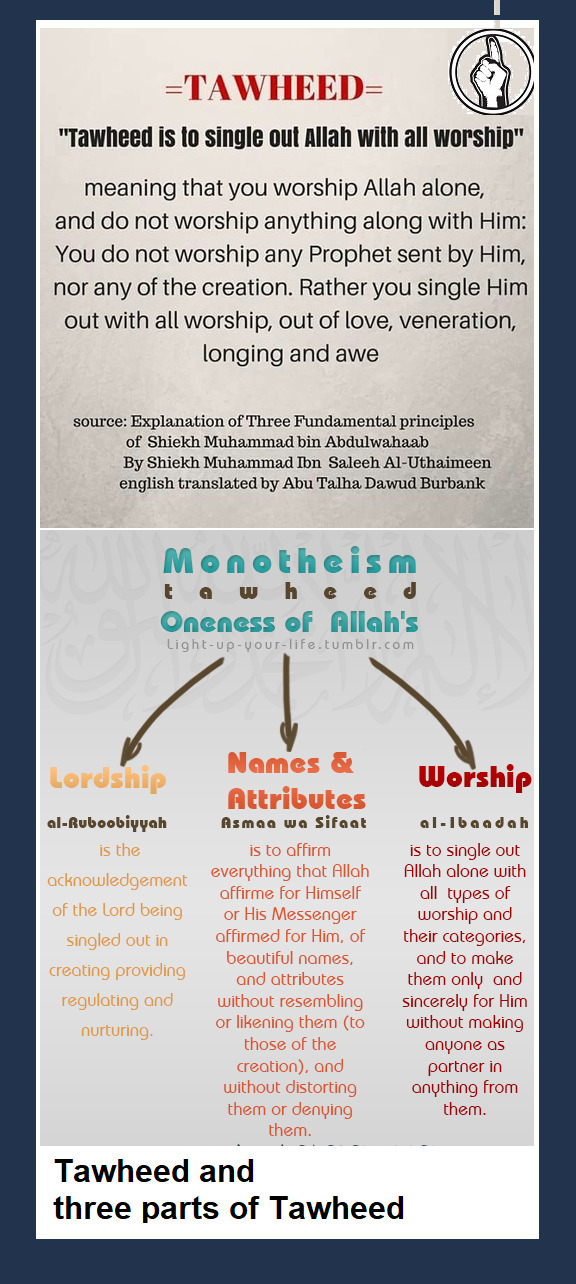
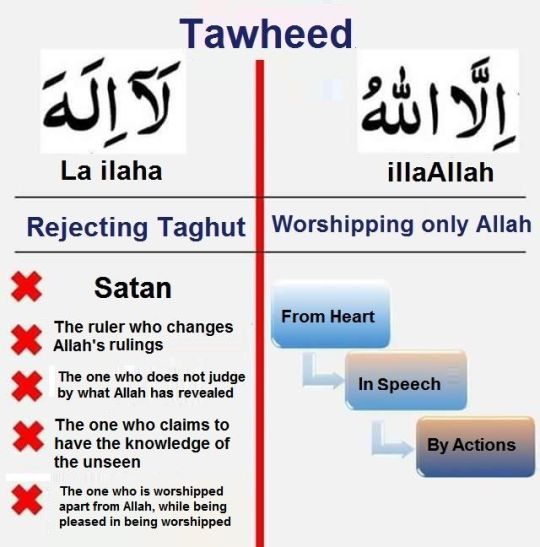
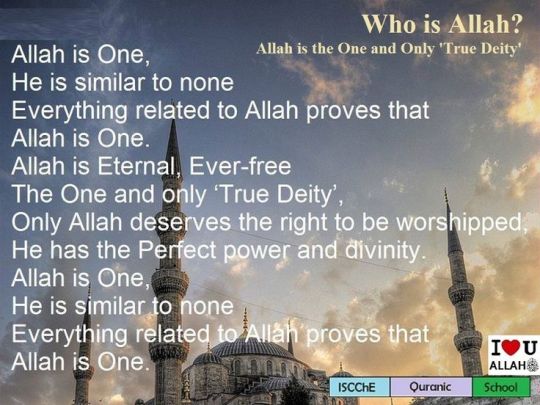








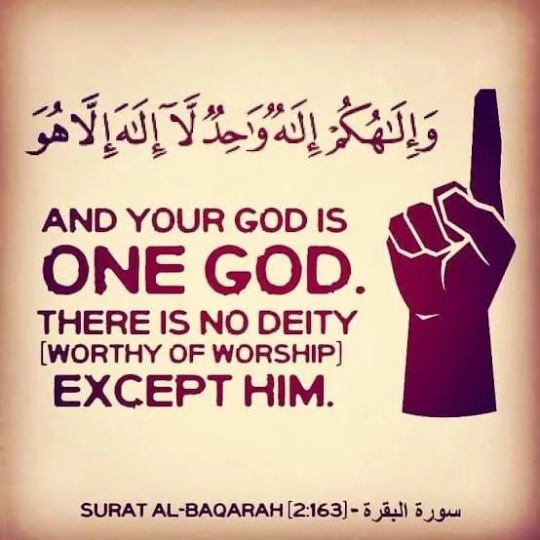


The highest politics is 'La ilaha IllAllah'.
'La Ilaha IllAllah' or #Tawheed is to knowing, believing, proclaiming and obeying the Oneness and Uniqueness of Allah. The Oneness of Allah i.e. Tawheed consists of three parts. (i) Tawheed ar-Rububiyyah (Maintaining the Oneness of Allah's Lordship). (ii) Tawheed al-Asma-Was-Sifat (Maintaining the Oneness of Allah's Names and Attributes). (iii) Tawheed al-Ibadah (maintaining unity of worship). Allah is the only 'true Lord'. In all matters related to Allah, Allah is the One, Sole, Unique, Perfect and without partners. He has no peer or equivalent. Know Allah by His most Beautiful Names and Perfect Attributes. From the first man and the first Prophet Adam (a.s.) to the last Prophet Muhammad, may Allah bless him and grant him peace, the basic call of all prophets and messengers was 'La ilaha illAllah' (there is no 'true God' but Allah). Namely: 'La Ilaha IllAllah Adamu Shafiullah'', 'La Ilaha IllAllah Nuhun Naziullah'', 'La Ilaha IllAllah Ibrahim Khalilullah', 'La Ilaha IllAllah Muhammadur Rasulullah'. Rejecting Taghut is the root of Tawheed.
youtube
Allah is the only true God
Allah's indivisible unicity is Tawhid
Tawhid is the central concept of Islam, and it refers to the belief in the oneness of Allah (The One God). The importance of Tawhid lies in the fact that it is the foundation of Islamic belief and practice.
Tawheed is the foundation upon which the religion of Islam is built, so focusing on Tawheed means focusing on the core. Because if we reflect on the Qur'an, we will see that it repeatedly explains the matters of Tawheed, so much so that there is not a single Surah in the Qur'an in which Tawheed is not mentioned, making it clear and prohibiting all matters that oppose Tawheed.
Our Lord is Allah Subhanahu wa Ta'ala.. Allah is unique, almighty, the only God. Allah is the only true Lord. There is no 'True Ilah'/ 'True Deity' except Allah. Allah is One, Unique in His Actions, Lordship, Authority, and Righteousness. Allah Ta'ala is Exalted above the throne in the sky (above all creation). Allah should be known by His beautiful name 'Asmaul Husna' and perfect attributes. Allah's name is more than 99. The Qur'an is the word of Allah. ultimate guidance for mankind.
Tawheed basically means the Oneness of Allah. There is only 1 true God, and that is Allah. Tawhid is the indivisible oneness concept of monotheism in Islam. Tawhid is the religion's central and single most important concept, upon which a Muslim's entire religious adherence rests. It unequivocally holds that God in Islam is One and Sing #Tawheed is made up of three parts: Tawhid means believing in Allah Alone as God and Lord & attributing to Him Alone all the attributes of Lordship and divinity. Tawhid is made up of 3 parts; Tawhid al-Rububiyyah (Oneness of Divine Lordship), Tawhid al-Uluhiyyah (Oneness of Divinity) &Tawheed al-Asma wa’l-Sifat (Oneness of Names and Attributes.
Allah's indivisible unicity is Tawhid
Tawhid: At the centre of all Islamic belief is the belief in one God-Allah. There is no other God but Allah and there is no one comparable to Him. We will never understand Allah as His nature supersedes our limited minds. We are created by Allah but He is not Himself created. Allah is the Unique,Omnipotent and Only Deity and Creator of the universe. Our Lord is Allah SWT. There is no 'True God' / 'True Deity' except Allah. Allah is Exalted Above His ‘Arsh (Mighty Throne’). Know Allah by His Most Beautiful Names & Lofty Attributes (Asma Was Sifat). Holy Qur'an is Allah's Word. Qur'an is final revelation & guidance for mankind.
youtube
youtube
youtube
Tawheed - The first call of the Messengers
Tawheed is to knowing, believing, declaring, obeying the oneness and uniqueness of Allah. The Oneness of Allah i.e. Tawheed consists of three parts. (i) Tawheed ar-Rububiyyah (Maintaining the Oneness of Allah's Lordship). (ii) Tawheed al-Asma-Was-Sifat (Maintaining the Oneness of Allah's Names and Attributes). (iii) Tawheed al-Ibadah (maintaining unity of worship). Allah is the only 'true Lord'. In all matters related to Allah, Allah is One, Sole, Final, Perfect and without partners. He has no peer or equivalent. Allah is to be known by His most beautiful Names and Perfect Attributes. From the first man and the first Prophet Adam (a.s.) to the last Prophet Muhammad, may Allah bless him and grant him peace, the basic call of all prophets and messengers was 'La ilaha illAllah' (there is no 'true God' but Allah). Namely: 'La Ilaha IllAllah Adamu Shafiullah'', 'La Ilaha IllAllah Nuhun Naziullah'', 'La Ilaha IllAllah Ibrahim Khalilullah', 'La Ilaha IllAllah Muhammadur Rasulullah'. Rejecting Taghut is the root of Tawheed.
youtube
Allah's indivisible unicity is Tawhid
Tawhid: At the centre of all Islamic belief is the belief in one God-Allah. There is no other God but Allah and there is no one comparable to Him. We will never understand Allah as His nature supersedes our limited minds. We are created by Allah but He is not Himself created. Allah is the Unique,Omnipotent and Only Deity and Creator of the universe. Our Lord is Allah SWT. There is no 'True God' / 'True Deity' except Allah. Allah is Exalted Above His ‘Arsh (Mighty Throne’). Know Allah by His Most Beautiful Names & Lofty Attributes (Asma Was Sifat). Holy Qur'an is Allah's Word. Qur'an is final revelation & guidance for mankind.
youtube
youtube
youtube
There is no 'true God' except Allah.
Tawheed is to knowing, believing, declaring, obeying the oneness and uniqueness of Allah. The Oneness of Allah i.e. Tawheed consists of three parts. (i) Tawheed ar-Rububiyyah (Maintaining the Oneness of Allah's Lordship). (ii) Tawheed al-Asma-Was-Sifat (Maintaining the Oneness of Allah's Names and Attributes). (iii) Tawheed al-Ibadah (maintaining unity of worship). Allah is the only 'true Lord'. In all matters related to Allah, Allah is One, Sole, Final, Perfect and without partners. He has no peer or equivalent. Allah is to be known by His most beautiful Names and Perfect Attributes. From the first man and the first Prophet Adam (a.s.) to the last Prophet Muhammad, may Allah bless him and grant him peace, the basic call of all prophets and messengers was 'La ilaha illAllah' (there is no 'true God' but Allah). Namely: 'La Ilaha IllAllah Adamu Shafiullah'', 'La Ilaha IllAllah Nuhun Naziullah'', 'La Ilaha IllAllah Ibrahim Khalilullah', 'La Ilaha IllAllah Muhammadur Rasulullah'.
Tawheed - The first call of the Messengers Rejecting Taghut is the root of Tawheed.
youtube
youtube
The highest politics is 'La ilaha IllAllah'.
রাজনীতির সর্বোচ্চ হল 'লাইলাহা ইল্লাল্লাহ
The Highest of Politics is 'Lailaha IllAllah'
Allah is the only true God
Allah's indivisible unicity is Tawhid
There is no 'true God' except Allah.
Allah's indivisible unicity is Tawhid
Rejecting Taghut is the root of Tawheed.
রাজনীতির সর্বোচ্চ হল 'লাইলাহা ইল্লাল্লাহ
#tawhid#allah'snature#allah'sdefinition#tawheed#The highest of politics is 'Lailaha illAllah'.#রাজনীতির সর্বোচ্চ হল 'লাইলাহা ইল্লাল্লাহ#The Highest of Politics is 'Lailaha IllAllah'#TheHighest#Politics#LailahaIllAllah'#রাজনীতিরসর্বোচ্চ#A#ALLAH#ALLAHSWT#Monnotheism#Tawheed#Tawhid#Tauhid#Touhid#'LailahaIllAllah'#highestpolitics#highest#politics#key#paradise#Jannah#threeparts#3parts#monotheism#Allah
0 notes
Text


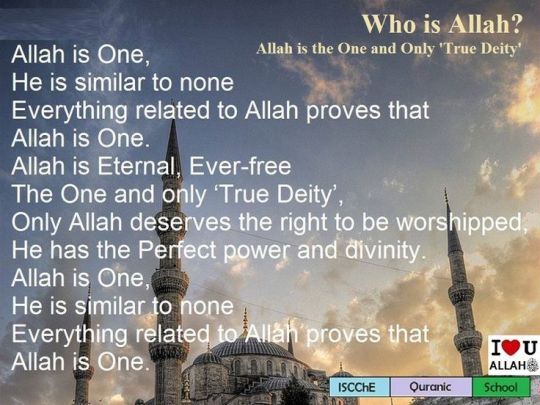







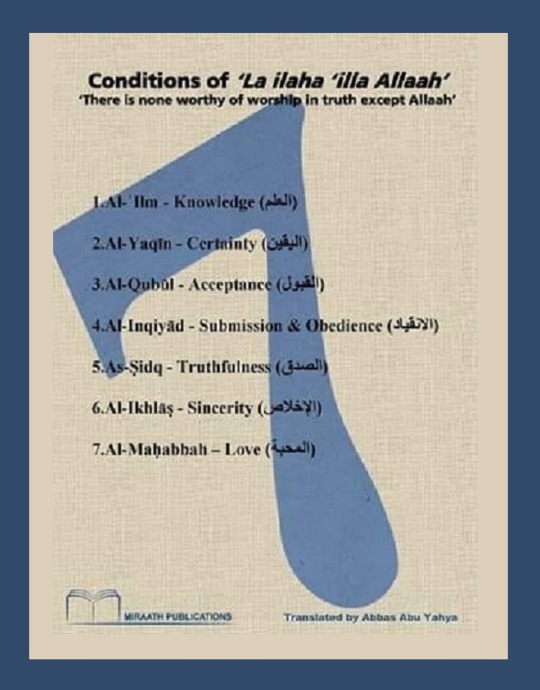
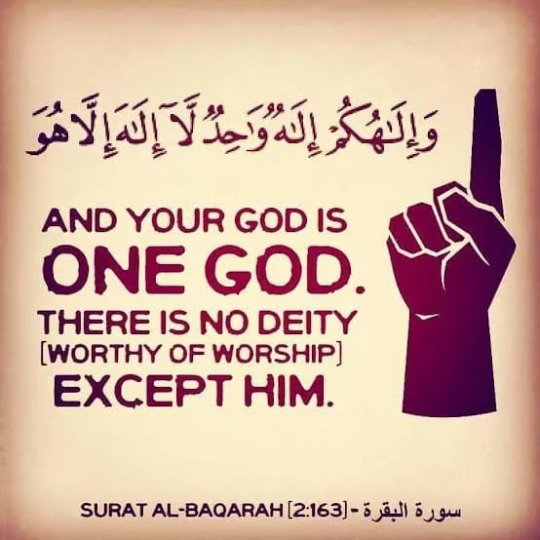
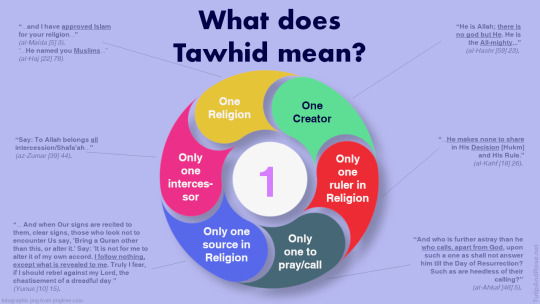

The highest politics is 'La ilaha IllAllah'.
'La Ilaha IllAllah' or #Tawheed is to knowing, believing, proclaiming and obeying the Oneness and Uniqueness of Allah. The Oneness of Allah i.e. Tawheed consists of three parts. (i) Tawheed ar-Rububiyyah (Maintaining the Oneness of Allah's Lordship). (ii) Tawheed al-Asma-Was-Sifat (Maintaining the Oneness of Allah's Names and Attributes). (iii) Tawheed al-Ibadah (maintaining unity of worship). Allah is the only 'true Lord'. In all matters related to Allah, Allah is the One, Sole, Unique, Perfect and without partners. He has no peer or equivalent. Know Allah by His most Beautiful Names and Perfect Attributes. From the first man and the first Prophet Adam (a.s.) to the last Prophet Muhammad, may Allah bless him and grant him peace, the basic call of all prophets and messengers was 'La ilaha illAllah' (there is no 'true God' but Allah). Namely: 'La Ilaha IllAllah Adamu Shafiullah'', 'La Ilaha IllAllah Nuhun Naziullah'', 'La Ilaha IllAllah Ibrahim Khalilullah', 'La Ilaha IllAllah Muhammadur Rasulullah'. Rejecting Taghut is the root of Tawheed.
youtube
Allah is the only true God
Allah's indivisible unicity is Tawhid
Tawhid is the central concept of Islam, and it refers to the belief in the oneness of Allah (The One God). The importance of Tawhid lies in the fact that it is the foundation of Islamic belief and practice.
Tawheed is the foundation upon which the religion of Islam is built, so focusing on Tawheed means focusing on the core. Because if we reflect on the Qur'an, we will see that it repeatedly explains the matters of Tawheed, so much so that there is not a single Surah in the Qur'an in which Tawheed is not mentioned, making it clear and prohibiting all matters that oppose Tawheed.
Our Lord is Allah Subhanahu wa Ta'ala.. Allah is unique, almighty, the only God. Allah is the only true Lord. There is no 'True Ilah'/ 'True Deity' except Allah. Allah is One, Unique in His Actions, Lordship, Authority, and Righteousness. Allah Ta'ala is Exalted above the throne in the sky (above all creation). Allah should be known by His beautiful name 'Asmaul Husna' and perfect attributes. Allah's name is more than 99. The Qur'an is the word of Allah. ultimate guidance for mankind.
Tawheed basically means the Oneness of Allah. There is only 1 true God, and that is Allah. Tawhid is the indivisible oneness concept of monotheism in Islam. Tawhid is the religion's central and single most important concept, upon which a Muslim's entire religious adherence rests. It unequivocally holds that God in Islam is One and Sing #Tawheed is made up of three parts: Tawhid means believing in Allah Alone as God and Lord & attributing to Him Alone all the attributes of Lordship and divinity. Tawhid is made up of 3 parts; Tawhid al-Rububiyyah (Oneness of Divine Lordship), Tawhid al-Uluhiyyah (Oneness of Divinity) &Tawheed al-Asma wa’l-Sifat (Oneness of Names and Attributes.
Allah's indivisible unicity is Tawhid
Tawhid: At the centre of all Islamic belief is the belief in one God-Allah. There is no other God but Allah and there is no one comparable to Him. We will never understand Allah as His nature supersedes our limited minds. We are created by Allah but He is not Himself created. Allah is the Unique,Omnipotent and Only Deity and Creator of the universe. Our Lord is Allah SWT. There is no 'True God' / 'True Deity' except Allah. Allah is Exalted Above His ‘Arsh (Mighty Throne’). Know Allah by His Most Beautiful Names & Lofty Attributes (Asma Was Sifat). Holy Qur'an is Allah's Word. Qur'an is final revelation & guidance for mankind.
youtube
youtube
youtube
Tawheed - The first call of the Messengers
Tawheed is to knowing, believing, declaring, obeying the oneness and uniqueness of Allah. The Oneness of Allah i.e. Tawheed consists of three parts. (i) Tawheed ar-Rububiyyah (Maintaining the Oneness of Allah's Lordship). (ii) Tawheed al-Asma-Was-Sifat (Maintaining the Oneness of Allah's Names and Attributes). (iii) Tawheed al-Ibadah (maintaining unity of worship). Allah is the only 'true Lord'. In all matters related to Allah, Allah is One, Sole, Final, Perfect and without partners. He has no peer or equivalent. Allah is to be known by His most beautiful Names and Perfect Attributes. From the first man and the first Prophet Adam (a.s.) to the last Prophet Muhammad, may Allah bless him and grant him peace, the basic call of all prophets and messengers was 'La ilaha illAllah' (there is no 'true God' but Allah). Namely: 'La Ilaha IllAllah Adamu Shafiullah'', 'La Ilaha IllAllah Nuhun Naziullah'', 'La Ilaha IllAllah Ibrahim Khalilullah', 'La Ilaha IllAllah Muhammadur Rasulullah'. Rejecting Taghut is the root of Tawheed.
youtube
Allah's indivisible unicity is Tawhid
Tawhid: At the centre of all Islamic belief is the belief in one God-Allah. There is no other God but Allah and there is no one comparable to Him. We will never understand Allah as His nature supersedes our limited minds. We are created by Allah but He is not Himself created. Allah is the Unique,Omnipotent and Only Deity and Creator of the universe. Our Lord is Allah SWT. There is no 'True God' / 'True Deity' except Allah. Allah is Exalted Above His ‘Arsh (Mighty Throne’). Know Allah by His Most Beautiful Names & Lofty Attributes (Asma Was Sifat). Holy Qur'an is Allah's Word. Qur'an is final revelation & guidance for mankind.
youtube
youtube
youtube
There is no 'true God' except Allah.
Tawheed is to knowing, believing, declaring, obeying the oneness and uniqueness of Allah. The Oneness of Allah i.e. Tawheed consists of three parts. (i) Tawheed ar-Rububiyyah (Maintaining the Oneness of Allah's Lordship). (ii) Tawheed al-Asma-Was-Sifat (Maintaining the Oneness of Allah's Names and Attributes). (iii) Tawheed al-Ibadah (maintaining unity of worship). Allah is the only 'true Lord'. In all matters related to Allah, Allah is One, Sole, Final, Perfect and without partners. He has no peer or equivalent. Allah is to be known by His most beautiful Names and Perfect Attributes. From the first man and the first Prophet Adam (a.s.) to the last Prophet Muhammad, may Allah bless him and grant him peace, the basic call of all prophets and messengers was 'La ilaha illAllah' (there is no 'true God' but Allah). Namely: 'La Ilaha IllAllah Adamu Shafiullah'', 'La Ilaha IllAllah Nuhun Naziullah'', 'La Ilaha IllAllah Ibrahim Khalilullah', 'La Ilaha IllAllah Muhammadur Rasulullah'.
Tawheed - The first call of the Messengers Rejecting Taghut is the root of Tawheed.
youtube
youtube
The highest politics is 'La ilaha IllAllah'.
রাজনীতির সর্বোচ্চ হল 'লাইলাহা ইল্লাল্লাহ
The Highest of Politics is 'Lailaha IllAllah'
Allah is the only true God
Allah's indivisible unicity is Tawhid
There is no 'true God' except Allah.
Allah's indivisible unicity is Tawhid
Rejecting Taghut is the root of Tawheed.
রাজনীতির সর্বোচ্চ হল 'লাইলাহা ইল্লাল্লাহ
The highest of politics is 'Lailaha illAllah'.
#allahswt#tawheed#tawhid#allah'snature#asmawassifat#whoisallah#allah'sdefinition#allah'snames#The Highest of Politics is 'Lailaha IllAllah'#TheHighest#Politics#LailahaIllAllah'#রাজনীতিরসর্বোচ্চ#A#ALLAH#ALLAHSWT#Monnotheism#Tawheed#Tawhid#Tauhid#Touhid#'LailahaIllAllah'#highestpolitics#highest#politics#key#paradise#Jannah#threeparts#3parts
0 notes